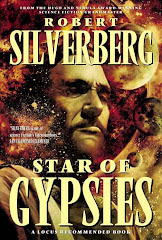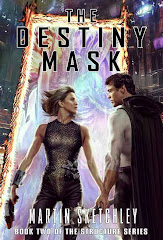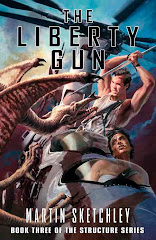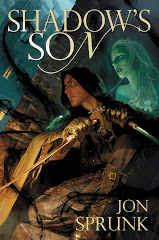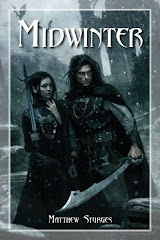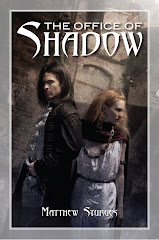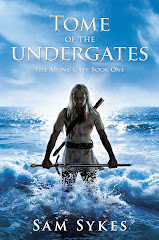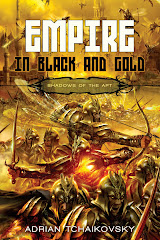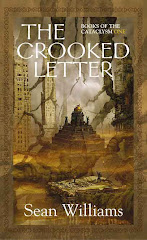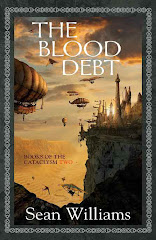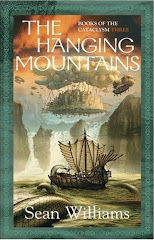.jpg) Mark Chadbourn embarked on an unprecedented depth of historical research and a detailed examination of real-world prehistoric sites around the United Kingdom to provide a compelling background for his Age of Misrule trilogy, which kicks off with the book World's End. The result is the last word on the real meaning of Arthurian mythology, wrapped up in an action-packed narrative that Grasping for the Wind calls, "exciting and riveting...a grand adventure, having as much in common with the myths and legends it twists to its own ends as it does the best of modern fantasy." Neth Space proclaims World's End is, "a wild ride through lands where modern Britain connects with the ancient past... Highly recommended." Here are the first three chapters of this pedal-to-the-floor, high-octane fantasy thriller that pitches magic and wonder into a pop culture mash-up of the modern world.
Mark Chadbourn embarked on an unprecedented depth of historical research and a detailed examination of real-world prehistoric sites around the United Kingdom to provide a compelling background for his Age of Misrule trilogy, which kicks off with the book World's End. The result is the last word on the real meaning of Arthurian mythology, wrapped up in an action-packed narrative that Grasping for the Wind calls, "exciting and riveting...a grand adventure, having as much in common with the myths and legends it twists to its own ends as it does the best of modern fantasy." Neth Space proclaims World's End is, "a wild ride through lands where modern Britain connects with the ancient past... Highly recommended." Here are the first three chapters of this pedal-to-the-floor, high-octane fantasy thriller that pitches magic and wonder into a pop culture mash-up of the modern world.World's End
Age of Misrule 1
Mark Chadbourn
prologue
And now the world turns slowly from the light. Not with the cymbal clash of guns and tanks, but with the gently plucked harp of shifting moods and oddly lengthening shadows, the soft tread of a subtle invasion, not here, then here, and none the wiser. Each morning the sun still rises on supermarket worlds of plastic and glass, on industrial estates where slow trucks lumber in belches of diesel, on cities lulled by the whirring of disk drives breaking existence down into digitised order. People still move through their lives with the arrogance of rulers who know their realms will never fall. Several weeks into the new Dark Age, life goes on as it always has, oblivious to the passing of the Age of Reason, of Socratic thought and Apollonian logic.Age of Misrule 1
Mark Chadbourn
prologue
No one had noticed. But they would. And soon.
chapter one
misty morning,
albert bridge
albert bridge
It was just before dawn, when the darkness was most oppressive. London was blanketed by an icy, impenetrable, February mist that rolled off the Thames, distorting the gurgle and lap of the water and the first tentative calls of the birds in the trees along the embankment as they sensed the impending sunrise. The hour and atmosphere were unfriendly, but Church was oblivious to both as he wandered, directionless, lost to thoughts that had turned from discomfort to an obsession, and had soured him in the process. If anyone had been there to see his passing, they might have thought him a ghost: tall and slim, with too-pale skin emphasised by the blackness of his hair and a dark expression which added to the air of disquieting sadness which surrounded him. The night-time walks had become increasingly regular over the past two years. During the routines of the day he could lose himself, but when evening fell the memories returned in force, too realistic by far, forcing him out on to the streets in the futile hope he could walk them off, leave them behind. It was as futile as any childhood wish; when he returned home he could never escape her things or her empty space. The conundrum was almost more than he could bear: to recover meant he would have to forget her, but the mystery and confusion made it impossible to forget; it seemed he was condemned to live in that dank, misty world of not-knowing. And until he did know he felt he would not be whole again.
But that night the routine had been different. It wasn’t just the memories that had driven him out, but a dream that God had decided His work, the world, had gone irrevocably wrong and He had decided to wipe it away and start again. Inexplicably, it had disturbed Church immeasurably.
There was a clatter of dustbins nearby, some dog scavenging for food. But just to be sure, he paused, tense and alert, until a russet shape padded soundlessly out of the fog. The fox stopped in its tracks when it saw him, eyed him warily for a second, until it seemed to recognise some similar trait, and then continued across the road until it was lost again. Church felt a frisson of some barely remembered emotion that he gradually recognised as a sense of wonder. Something wild and untamed in a place shackled by concrete and tarmac, pollution and regulations. Yet after the initial excitement it served only to emphasise the bleak view of the world he had established since Marianne. Perhaps his dream had been right. He had never really been enticed by the modern world. Perhaps that was why he was so drawn to archaeology as a child. But now everything seemed so much worse. If there was a God, what would he want with a world where such a vital force as a sense of wonder was so hard to come by? Although most people seemed to hark back to some golden age where things were felt so much more vibrantly, it seemed to Church, with his new eyes, that they didn’t even seem to have the passion to hate the world they lived in; they were simply bowed by the boredom of it: a place of routine and rules, where daily toil was the most important thing and the only rewards that really counted were the ones that came in currency. There wasn’t anything to get excited about any more; nothing to believe in. You couldn’t even count on God. Churches of all denominations seemed to be in decline, desperately stripping out the supernatural wonder for some modernist sense of community that made them seem like dull Oxfam working parties. But he had no time for God anyway. And that brought him in an ironic full circle: God was preparing to wipe the world clean and God didn’t exist.
He snorted a bitter laugh. Away in the mist he could hear the fox’s eerie barking howl and for a hopeful second he considered pursuing it to a better place. But he knew in his heart he wasn’t nimble enough; his legs felt leaden and there seemed to be an unbearable weight crushing down on his shoulders.
And then all the thoughts of God got him thinking about himself and his miserable life, as if there were any other subject. Was he a good person? Optimistic? Passionate? He had been once, he was sure of it, but that was before Marianne had turned everything on its head. How could one event sour a life so completely?
It wasn’t the damp that drew his shiver, but he pulled his overcoat tighter nonetheless. Sometimes he wondered what the future held for him. Two years ago there had been so much hope stitched into the direction he had planned for his life: more articles for the learned magazines, a book, something witty and incisive about the human condition, which also instigated a quiet revolution in archaeological thinking, building on the promise he had shown at Oxford when he had become the first member of his family to attain a degree. At twenty-six, he had known everything about himself. Now, at twenty-eight, he knew nothing. He was flailing around, lost in a strange world where nothing made sense. Any insight he thought he might have had into the human condition had been expunged, and poking about in long-dead things suddenly hadn’t seemed as attractive as it had when he’d been the leading light of his archaeology course. It sounded pathetic to consider it in such bald terms, and that made it even more painful. He had never been pathetic. He had been strong, funny, smart, confident. But never pathetic. He had potential, ambitions, dreams, things that he thought were such a vital part of him he would never be able to lose them, yet there he was without any sign of them at all. Where had they all gone?
The only work of which he had felt capable was hack journalism, turning technical manuals into plain English and writing PR copy, bill-paying rather than future-building. And all because of Marianne. Sometimes he wished he could channel his feelings into bitterness, maybe even hate, anything that would allow him to move on, but he just wasn’t capable of it. She’d dragged him out of life and left him on a mountaintop, and he felt he would never be able to climb down again.
With a relief that was almost childlike in its intensity, his thoughts were disturbed by a splashing of water which jarred against the sinuous sounds of the river. At first Church thought it might have been a gull at the river’s edge, another sign of raw nature intruding on his life, but the intermittent noise suggested something larger. Leaning on the cold, wet wall, he waited patiently for the folds of mist to part as the splashing ebbed and flowed.
For several minutes he couldn’t see anything, but as he was about to leave, the mist unfurled in a manner that reminded him of a theatre curtain rolling back. Framed in the white clouds at the river’s edge was a hunched black shape, like an enormous crow. As it dipped into the eddies, then rose shakily, Church glimpsed a white, bony hand. An old woman, in a long, black dress and a black shawl, was washing something he couldn’t see; it made him think of pictures of peasants in the Middle East doing their laundry in muddy rivers. The strangeness of a woman in the freezing water before dawn didn’t strike him at first, which was odd in itself, but the more he watched, the more he started to feel disturbed by the way she dipped and washed, dipped and washed. Finally the jangling in his mind began to turn to panic and he started to pull away from the sight. At that moment the woman stopped her washing and turned, as if she had suddenly sensed his presence. Church glimpsed a terrible face, white and gaunt, and black, piercing eyes, but it was what she held that filled his thoughts as he ran away along the footpath towards Albert Bridge. For the briefest instant it appeared to be a human head, dripping blood from the severed neck into the cold Thames. And it had his face.
Ruth Gallagher had a song in her head that she couldn’t quite place; something by The Pogues, she thought. Then she considered the holiday she hoped to take in the South of France that summer, before admiring the pearly luminescence of the mist as it rolled across the surface of the Thames. And when she opened her ears again Clive was still whining irritatedly.
“And another thing, why do you always have to act so superior?”
Clive gesticulated like he was berating a small child. He didn’t even look at her; he had been lost in his rant for so long that she was no longer needed in the conversation.
“I don’t act superior, I am.” It was the wrong thing to say, but Ruth couldn’t resist it. She had to stifle a smile when a sound like a boiler venting steam erupted from his throat. It didn’t help that at nearly six foot, she towered above him. Such nastiness wasn’t normally in her nature, but he had treated her so badly throughout the evening she felt justified, while still acknowledging the whiff of childishness in her response.
When they had met at the Law Society dinner six weeks earlier, she went into the relationship with the same hope and optimism as always; it wasn’t her fault that it hadn’t worked out. In fact, after so many previous failed relationships, she had tried especially hard, but Clive was like so many other men she had met in recent times: self-obsessed, nervous of her intellect and wit while professing the opposite, quickly becoming insecure when they realised she wasn’t so desperate to hold on to them that she’d kowtow to their every whim and turn a blind eye to their many insufferable qualities. It didn’t take her long to see that Clive equated long, dark, curly hair and refined, attractive features with some pre-war view of femininity which he could easily control.
That sort of attitude could have made her blood boil, but the simple truth was she had realised that night that she felt so far removed from him it was hardly worth losing sleep over.
But Clive was just symptomatic of a wider malaise. Nothing in her life seemed fixed down, as she had expected it would be by the time she approached thirty; the job, her great ambition since her father had instilled it in her at thirteen, left her feeling empty and weary, but it was too late to go back and start over; she was ambivalent about London; the best word she could find for her friends and social life was pleasant. It was as if she was holding her breath, waiting for something to happen.
She hummed The Pogues’ song in her head, trying to recall the chorus, then turned her attention once more to the marvellous way the mist smothered the echoes of their footsteps. Not far to go until she was home, she thought with relief.
“And another thing—”
“If you say that one more time, Clive,” Ruth interjected calmly, “I’ll be forced to perform an emergency tracheotomy on you with my fountain pen.”
Clive threw his arms in the air. “That’s it! I’ve had enough! You can make your way home alone.”
He spun on his heels and Ruth watched him march off into the fog with his head thrust down like some spurned, spoiled child. “The perfect gentleman,” she muttered ironically.
As his footsteps faded away, Ruth became acutely aware of the stifling silence. She wished she’d left the club earlier, or at least countermanded Clive’s order for the cab to pull over so they could have a “quiet chat” as they walked the last few hundred yards to her flat. London wasn’t a safe place for a woman alone. Her heels click-clacked on the slick pavement as she speeded up a little. The rhythm was soothing in the unnerving quiet, but as she approached Albert Bridge other sounds broke through: scuffles, gasps, the smack of flesh on flesh.
Ruth paused. Her every instinct told her to hurry home, but if someone was in trouble she knew her conscience wouldn’t allow her to ignore it. She was spurred into life by a brief cry, quickly strangled, that seemed to come from the river’s edge in the lonely darkness beneath the bridge. Two itinerants fighting over the remnants of a cheap bottle of wine, she supposed, but she had seen too many police reports to know the other possibilities were both many and disturbing. She located the steps to the river and moved cautiously down until the mist had swallowed up the street lights behind her.
When he heard the same struggle, Church’s heart rate had just about returned to normal, but his nerves still jangled alarmingly. The image of the woman’s terrible face wouldn’t go, but he had almost managed to convince himself he had been mistaken in his view of what she was holding. Just a bundle of dirty clothes, a trick of the light and the fog. That was all.
He had been approaching Albert Bridge from the opposite direction to Ruth when the scuffling sounds provided a welcome distraction. Negotiating the treacherously slick steps down to the river, he found himself on a rough stone path that ran next to the slim, muddy beach at the water’s edge, where an oppressive smell of rotting vegetation filled the dank air. A slight change in the quality of light signalled that somewhere above the mist, dawn was finally beginning to break, but the gloom beneath the bridge was impenetrable.
With only the soothing lapping of the Thames around him, he wondered if he had misheard the source of the fight. He paused, listening intently, and then a muffled cry broke and was instantly stifled. Cautiously he advanced towards the dark.
Keeping close to the wall so he wouldn’t be seen, odd sounds gradually emerged: heavy boots on stones, a grunt, a choke. Finally, at the edge of the darkness, his eyes adjusted enough to see what lay beneath the bridge.
A giant of a man with his back to Church grasped a smaller man by the lapels. The victim looked mousily weak, with tiny, wire-framed spectacles on a grey face, his frame slight beneath a dark suit. There was a briefcase lying on the ground nearby.
The taller man, who must have been at least seven and a half feet tall, turned suddenly, although Church was sure he hadn’t made a sound. The giant had a bald head and long, animalistic features contorted by a snarl of rage. In the shadows, his pale, hooded eyes seemed to glow with a cold, grey fire. Church shivered unconsciously at the aura of menace that washed off him in a black wave.
“Put him down.”
Church started at the female voice. A woman with long dark hair and a beautiful, pale face was standing on the other side of the bridge, framed against the background of milky mist.
The tall man’s breath erupted in a plume of white as it hit the cold; there was a sound like a horse snorting. He looked slowly from Church to the woman and back, effortlessly holding his victim like a rag doll, his gaze heavy and hateful. Church felt his heart begin to pound again; something in the scene was frightening beyond reason.
“If you don’t put him down, I’m going for the police,” the woman continued in a calm, firm voice.
For a moment Church thought the victim was dead, but then his head lolled and he muttered something deliriously. There was contempt in the attacker’s face as he glanced once more at Church and the woman, and then he hauled the smaller man off the ground with unnatural ease. Transferring his left hand to his victim’s chin, he braced himself, ready to snap the neck.
“Don’t!” Church yelled, moving forward.
In that instant, for no reason he could pinpoint, Church felt fear explode in every fibre of his being. The giant glared at him and Church had the disorienting sensation that the mugger’s face was shifting like oil poured on water. He flashed back to the old woman at the water and what she was holding, and then his thoughts devolved into an incomprehensible jumble. His brain desperately tried to comprehend the retinal image of the giant’s face becoming something else, and for a moment he almost grasped it, but the merest touch of the sight was like staring into the heart of the sun. His mind flared white, then shut down in shock, and he slumped to the ground unconscious.
Dawn had finally come when Church woke to the sensation of hands pulling him into a sitting position. There was a spinning moment of horror when he thought he was still staring at the changing face, and then he became dimly aware of the dampness of his clothes from the wet ground and a flurry of movement and sound around him. He grappled for some kind of understanding, but there was a yawning hole in his memory from the moment of his collapse, as raw as if he had been slashed with a razor.
“Are you okay?” A paramedic crouched in front of him, shining a light into his eyes. When the flare cleared, Church saw uniformed police and what were obviously plain-clothes detectives hovering near the river’s edge.
Church remembered the mugger and his victim and suddenly lurched forward. The paramedic held him back with a steady hand. “Did you see what happened?” he asked.
Church struggled for the words. “Some kind of fight. Then . . .” He glanced around him curiously. “I suppose I fainted. Pathetic, isn’t it?”
The paramedic nodded. “She said the same thing.”
Nearby was the woman Church had seen earlier. A blanket was draped around her shoulders; a medic checked her over while a detective tried to make sense of her replies. As Church watched, she looked up at him. In the second when their eyes met, Church had a sudden sensation of connection that went beyond the shared experience: a recognition of a similar soul. It was so intimate that it made him uncomfortable, and he looked away.
“Do you feel up to a few questions, sir?” The detective offered a hand and Church allowed himself to be hauled to his feet. The CID man seemed unnaturally calm for the activity going on around them, but there was an intensity in his eyes that was disturbing. As they headed towards the water’s edge, Church saw the body in the glare of a camera flash; the neck had been broken.
“How long was I out?” Church asked.
The detective shrugged. “Can’t have been long. Some postman on his bike heard the commotion and we had a car here within five minutes of his call. What did you see?”
Church described hearing the noise of the fight and then seeing the tall man mugging his victim. The detective eyed him askance, a hint of suspicion in his face. “And then he attacked you?”
Church shook his head. “I don’t think so.”
“So what happened to you and the young lady?”
There was an insectile skittering deep in his head as he fought to recall what he had seen; he was almost relieved when the memory refused to surface. “I was tired, the ground looked so comforting . . .” The detective gave him the cold eye. “How should I know?” Church looked round for a way to change the subject. “Where’s his briefcase?”
“We didn’t find one.” The detective scribbled a line in his notebook and seemed brighter, as if the disappearance of the briefcase explained everything; a simple mugging after all.
Church spent the next hour at the station, growing increasingly disturbed as he futilely struggled to express his fears in some form the police could understand. In reception, he bumped into his fellow witness, whose expression suggested she had had a similar experience.
“Look, can we go and grab a coffee? I need to talk about this,” she said without any preamble. She ran her fingers through her hair, then lightened. “Sorry. Ruth Gallagher.” She stuck out a hand.
Church took it; her grip was strong and confident. “Jack Churchill. Church. They weren’t having any of it, were they?”
Ruth sighed wearily. “No surprise there. I’m a solicitor, in court every day. I found out pretty early on that once the police have discovered the most simplistic idea out there, they’re like a dog with a bone. If they want to file this under M for Mugging, by God they’re going to, and nothing I’m going to say will change their minds.”
“A mugging. Right. And JFK got roughed up that day in Dallas.” Church watched her features intently, trying to discern her true thoughts.
She looked away uncomfortably, disorientation and worry reflected in her face.
There was an intensity about her that Church found impossible to resist. They went to a little place on St. John’s Hill at Clapham Junction, filled with hissing steam from the cappuccino machine, the sizzle of frying food and the hubbub of local workers taking an early breakfast. They sat opposite each other at a table in the window and within seconds all the noise had faded into the background.
Sipping her coffee hesitantly, Ruth began. “What did we see?”
Church chewed on his lip, trying to find the words that would tie down the errant memory. “It seemed to me that his face began to change.”
“Impossible, of course,” Ruth said unconvincingly. “So there has to be a rational explanation.”
“For a changing face?”
“A mask?”
“Did it look like a mask to you?” He tapped his spoon in his saucer. The merest attempt at recollection made him uncomfortable. “This is what I saw: a man, much bigger than average, picked up someone with a strength he shouldn’t have had, even at that size. Then he turned to us and his features started to flow away like they were melting. And what lay beneath—” He swallowed. “—I have no idea.”
“And then we both went out at exactly the same time.”
“Because of what we saw next.”
Ruth gave an uncomfortable smile. “I’m not the kind of person who has hallucinations in a moment of tension.”
Church glanced out of the window, as if an answer would somehow present itself to him, but all he could see was a tramp on the opposite side of the road watching them intently. There was something about the unflinching stare that disturbed him. He turned back to his coffee and when he looked again the tramp was gone.
“This whole business is making me paranoid,” he said. “Maybe we should leave it at that. We’re not going to discover what happened. Just put it down to one of those inexplicable things that happen in life.”
“How can you say that?” Ruth exclaimed. “This was real! We were right at the heart of it. We can’t just dismiss it.” She leaned forward with such passion Church thought she was going to grab his jacket. “You must have some intellectual curiosity.”
“I find it difficult to get curious about anything these days.” There was a hint of surgical dissection in the way she eyed him; he almost felt his ego unpeeling.
“At least give me your number in case one of us remembers any more details,” she said. It was too firm to be a request. Church scribbled the digits on a paper serviette and then took Ruth’s business card for her practice in Lincoln’s Inn Fields with her home number on the back.
As he rose, she said, in a quiet voice that demanded reassurance, “Were you frightened?”
He smiled falsely, said nothing.
The days passed bleakly. Winter receded a little more, but there was still an uncomfortable chill in the air that even the suffocating central heating of Church’s flat seemed unable to dispel. Once spring was just around the corner, he always used to feel an urge to get his hands dirty in some dig or other, grubbing around for flaking bits of pottery or corroded nails which used to instil in some people a depression for the fleeting nature of life, but always filled him with a profound sense of the strength of humanity. At that moment, as he dredged deeply for any remaining vestige of enthusiasm to help him complete a manual for spreadsheet software, the feeling seemed further away than ever. It was compounded by a terrible uneasiness brought on by what he now called that night; whatever secret his mind held pressed at the back of his head like a tumour, sometimes feeling so malign it unleashed a black depression of such strength he found himself considering suicide, a feeling he had never countenanced before, even in the worst days after Marianne had left.
Dale, one of his few friends from before (he always saw his life as two distinct units, Before Marianne and After Marianne), was so shocked by his latest state of mind he almost attempted to press-gang Church into getting some kind of medical help. After a wearying struggle, Church had convinced him it was simply a passing phase, while secretly knowing neither Prozac nor EST could put him back on the road to well-being. The only option was to lance the boil, unleash the memory, and how could he do that when it was so unbearable in the first place?
“You’ve got to start getting out, you know.” Dale, always the most irresponsible of his friends, suddenly sounded like some geriatric relative. Church, seeing how he was infecting others, winced with guilt.
“It’s not as simple as that.”
“I know it’s not as simple as that. I’m not stupid,” Dale bristled. He swigged from his beer bottle, then suddenly flicked it in a loop in the air and caught it without spilling a drop. “Hey! That was good, wasn’t it?”
“Marvellous.”
“Okay. This weekend. We get a bootful of cans and take off for Brighton. Drink them all under the pier, a few burgers, a mountain of candy floss, then off to the pleasure beach and see who’s first to vomit on the rides. You know it has to be done.”
Church smiled wanly; two years ago he would never have guessed Dale would have been the one to stick around. “It’s a good idea, but I’ve got too much work on. Financial planning software, for my sins. It’s got to be in by Monday.”
Dale said, resignedly, “You remember the time you cancelled your holiday in Cyprus and bundled us all into the car for a week in Devon to cheer up Louise after her dad died? That was spontaneous fun.”
Church shrugged. “Cyprus would have been too hot that time of year, anyway.”
“You don’t fool me. You’d been planning for that holiday for months. Years probably, knowing you. And you gave it up in an instant.”
“I’m so selfless,” Church said sarcastically. He caught Dale examining him as if searching for the person he remembered. “Of course, I’ve still got the photo of you at that gig we drove up to in Oxford.”
Dale blanched. “Not the one where I lost my trousers when I was stage-diving?”
“Boxers too. Jesus, that was a horrible sight.”
“I was expecting you to catch me, not take photos!” Dale said indignantly. “If I ever find out who pulled my keks down—”
“Serves you right for stage-diving. The rest of us were respectfully enjoying the music,” Church mocked.
“Yeah, you were a real muso, weren’t you? You were like the bleedin’ HMV computer. Name a CD and you’d list every track on it. And you could play the guitar and the drums. Bloody show-off.”
“You know you needed me. I provided the intellectual conversation while the rest of you were drinking your own weight in alcohol.”
Dale chuckled at the memories. “We had some laughs too, right? You, me, Pete, Kate, Louise, Billy . . .”
And Marianne.
“That was a long time ago,” Church said.
Dale visibly winced at his faux pas. “Listen to me. I sound like some old git reminiscing about the war.” His voice trailed off, and he looked Church in the eye a little uncomfortably. “We can’t keep talking around it, you know.”
“I’m okay,” Church protested. Here it was, as he feared, coming up on him from his blindside. “I’m not some sap mooning around who can’t accept his girlfriend’s gone. It’s been two years!”
“Bollocks. We both know it’s not about the fact she’s not here. It’s the way it happened. And what you saw. That would be enough to screw anybody up.”
“Are you saying I’m screwed up?”
“Are you telling me you’re not?” Dale dropped his bottle and the contents flooded out. “Shit. Now look what you’ve made me do.”
“Forget it.”
Dale scrubbed the beer into the carpet with his boot. “You shouldn’t tear yourself apart. It wasn’t your fault, you know.”
“You think she’d have gone like that for no reason? Of course it was my fault.”
“Listen, you’re a good bloke. I’ll never repeat this in company, but you’re probably the most decent bloke I’ve ever met.” He paused thoughtfully. “I know about your doctorate, you know.”
“What are you talking about?” Church looked away.
“Billy’s a screw-up—he always was. But you gave him that money you’d been working round the clock for a year to save so you could go back and get that qualification you’d been dreaming about ever since you were a kid. Don’t deny it, Church—he told me, even though you tried to keep it a secret. I know your family never had much and you had to get a job to send some cash back to them. And then you saved Billy from all that disgrace and now look at him—the fattest of fat-cat accountants in the West End. Thanks to you. And all it cost you was your life’s dream—to be a doctor of digging-up-crap. Not much to anybody else, but I know how much it meant to you. So don’t go beating yourself up thinking you’re some little shit because of Marianne.”
Church shook his head dismissively. Dale didn’t understand—how could he?
“I’m only saying these things because I’m a mate.” Dale was on a roll now; Church recognised the gleam in his eye. “I remember what you used to be like. You used to enjoy yourself, all the time, even when the rest of us were miserable and it was pissing down with rain and some club wouldn’t let us in because Billy was dressed like a stiff again. When Louise and Pete had one of their irritating arguments, you’d always find something positive to get them back together. You used to read more books and see more films and hear more music than anybody I knew. And now—”
“I don’t.”
“Exactly. Now you don’t do anything. You’ve lost all focus. What’s done is done. You’ve got to start living again.”
Church made some concilatory sounds, but it didn’t convince Dale; he’d heard it all before. In the end he departed in irritation, but Church knew he’d be back to try again. He was good like that. But Dale couldn’t be expected to understand the depth of the problem, how many futile hours had been spent looking at it from every angle; if there was an easy solution he would have found it long ago. The worst thing was he felt so bad about how he’d made Dale feel over the months, he couldn’t bring himself to talk about the experience under Albert Bridge.
For the rest of the evening he kept flashing back to the moment before he fainted that night, interspersed with too many memories of Marianne: on the banks of Loch Ness, at her birthday in Covent Garden, the Sunday morning she brought him a champagne breakfast in bed for no reason apart from the fact that she loved him. Finally sleep crept up on him.
“Ruth. My office. Now!”
Ruth dropped the pile of files at Milton’s barked order and then cursed under her breath as she scrambled to collect them. What was wrong with her? She wasn’t the nervous type, but since that morning by the river she had been permanently on edge, jumping at shadows, snapping at colleagues. Her work had always been the calm centre of her life where she could do no wrong, but now it seemed dangerously askew.
Dumping the files on her desk, she marched into Milton’s glass-walled office, sensing the atmosphere before she had crossed the threshold. The senior partner glowered behind his desk.
“Close the door,” he growled, his repressed anger bringing out his Highland brogue. That was always a bad sign. Ruth waited for the fireworks.
“What’s wrong with you, Ruth?” he asked. “Is it drugs? Drink?”
“I don’t know what you mean, Ben.”
He tapped a letter that was placed precisely in the centre of his blotter. “Sir Anthony is absolutely livid. He says you hung up on him yesterday.”
“It was an accident,” she lied. She’d always been able to cope with the peer’s toffee-nosed pomposity and condescension, but, for some reason, yesterday she’d had enough. She knew at the time she should have called him back, but she couldn’t bear to listen to any more of his bluster.
“He’s our top client, for God’s sake! Do you know how much money he brings into this firm? And he was your client because you were the best and you could be trusted.”
Ruth didn’t like the sound of the past tense. “It won’t happen again, Ben.”
“It’s not the only thing, Ruth. Not by a long shot.” He angrily flicked open a thin file. “During the last two weeks you’ve overcharged three clients, undercharged two. Your brief to the barrister in the Mendeka case was so incompetent it’s possibly actionable. You were so late in court on Friday the case had to be rescheduled. Two weeks for at least three sackable offences. Jesus Christ, what kind of a firm do you think this is?” Her ears burned. “To be honest, I don’t want to know what’s wrong,” he continued. “I just want it sorted out. Anybody else would have been out on their ear by now, but your past record has been exemplary, Ruth. I hope you’ve not simply become aware of that and you’re resting on your laurels.”
“No, Ben—”
“—Because even our best man can’t go about pissing off the clients who make this a premier league firm thanks to their patronage and their money. At your best you’re still an asset to us. I want you to find out where that best has gone.”
“Ben?”
“You’ve got some time off, unpaid of course. The next time you’re here I want it to be the old Ruth.”
He lowered his attention to the paper on the desk in a manner that was both irritating and insulting. Ruth had never liked him, but at that moment she wanted to grab him by the lapels and punch him in the face. The only thing that stopped her was that every word had been true.
In the toilet, she blinked away tears of frustration and rage and kicked the cubicle door so hard it almost burst off its hinges; her hatred for the job made her feel even worse. It had never been what she wanted to do, but her father had been so keen she hadn’t been able to refuse him. But that wasn’t the real cause of her sudden bout of incompetence; it was the scurrying, black lizard-thing that had taken up residence in her head.
For the first time she had an inkling how the victims of abuse suffered in later life from the hideous repressed memories that manipulated their subconscious. Whatever had truly happened that early morning beneath Albert Bridge had turned her into a different person: depressive, anxious, underconfident, hesitant, pathetic.
She put her hands over her eyes and tried to hold the emotions back.
Church was spending too long surfing the web and he knew his phone bill would be horrendous, but there was something almost soothing in the crashing waves of information. It was zen mediation for the new age; every time he felt an independent thought enter his head he would click on the hotlink and jump to a new site with new images and words to hypnotise him. He had been around a score of different subjects—cult TV, music, new science, even delving into some of the archaeology sites, but somehow he had found himself at www.forteantimes.com—and everything had gone horribly wrong.
He knew vaguely of the magazine the website represented. The journal of strange phenomena, Fortean Times it called itself, an erudite publication which examined every odd happening, from crop circles and UFOs to contemporary folklore, bizarre deaths to crazy coincidences, with a ready wit and a sharp intellect. He always flicked through copies in Smiths, but he’d never gone so far as buying one.
On the lead page was a brief story:
In the last few weeks the world has gone totally weird! As you know, we continually compile all reports of strange phenomena from around the globe for an annual index to show if the world is getting weirder. Since Christmas the number of reports has increased twentyfold. Postings on the Fortean newsgroup {alt.misc.forteana} indicate an astonishing increase in all categories, from electronic voice phenomena and hauntings via amazing cryptozoological sightings to UFOs and accounts of more big cats in the wilderness. What’s going on!?!Church went through the report twice, feeling increasingly unnerved for reasons he couldn’t explain. Briefly he considered how he should have read it—as cranky but fun—but it sparked disturbing connections in his mind. He clicked on the hotlink to Usenet. When alt.misc.forteana appeared, he scrolled slowly through the postings. In Nottingham, a sound engineer for Central TV had recorded strange giggling voices when his microphone should have been picking up white noise from a radio. A rain of fish had fallen on Struy in the Scottish Highlands. Mysterious lights had been seen moving slowly far beneath the surface of Ennerdale Water in the Lake District. A postmistress from Norwich wrote passionately about a conversation with her dead father late one evening. Unconnected incidents, but as he worked his way down the neverending list of messages he was staggered by the breathtaking diversity of unbelievable things happening around the country, to people from all walks of life, in all areas. The accounts were heartfelt, which made them even more disturbing. It put his own odd experience into some kind of context.
One posting leapt out at him from LauraDuS@legion.com. It said simply:
All this is linked. And I have proof.He vacillated for a moment or two, then rattled off a quick reply requesting more information.
Email me if you want to know more.
Further down the list there was a message from one of the Fortean Times editors, Bob Rickard, talking in general terms about the magazine’s philosophy. With a certain apprehension, Church typed out the details of his experience at Albert Bridge and sent it off for Rickard’s views. Then he returned to the list and immersed himself in the tidal wave of weirdness.
With bleary eyes and a dry mouth, he eventually came offline at 1 a.m. feeling an odd mixture of excitement, agitation, concern, and curiosity that left his head spinning. It was a pleasure to feel anything after two years of hermetically sealed life.
Away from the computer, he became aware once again of the hidden memory’s horrible presence at the back of his head; his mood dampened instantly and he knew there would be no relief for him until that desperate event was put into some kind of perspective. He was so lost in his introspection that at first he didn’t notice the figure outside as he began to draw the curtains. But a passing car disturbed him and within seconds he had grown rigid and cold. From his first-floor vantage point, the figure was half-hidden by the overhanging branches of the tree across the road, but the subtle way the body was held was as unmistakable to him as his own reflection.
And a second later he was running through the flat and down the stairs, feeling the first tremors of shock ripple through his body, wincing as the cold night air froze the sweat that seemed to be seeping from every pore. Desperation and disbelief propelled him out into the road, but the figure was gone, and although he went a hundred yards in both directions, there was no sign of the person who had been watching his window. Finally he sagged to his knees at the front gate and held his head, wondering if he had gone insane, feeling his thoughts stumble out of control. There were tears where he thought he had exhausted the well. It had been Marianne, as surely as the sun came up at dawn.
And Marianne had been dead for two years.
chapter two
different views
from the same window
different views
from the same window
Inactivity did not sit well with Ruth and it seemed only right that her enforced absence from work should be put to good use. Although she knew the buried trauma of Albert Bridge was responsible for her daytime confusions, black moods and constantly disturbed nights, she was determined she would not be paralysed by it; practicality was one of the strengths which had seen her rise so rapidly in the firm.
No one had been arrested for the Albert Bridge murder, although photofits based on Ruth and Church’s descriptions had been given wide circulation throughout the media; the suspect had appeared so grotesque that Ruth found it hard to believe he hadn’t been picked up within hours. Yet the investigation had drawn repeated blanks and as the days turned to weeks it became increasingly apparent it wasn’t going anywhere. One advantage of Ruth’s position with Cooper, Sedgwick & Tides was her direct access to the Met, where she found plenty of contacts who weren’t averse to allowing her a glimpse into a restricted file or digging up some particular snippet of information. So it was relatively easy to find herself that morning in an empty room, bare apart from a rickety table, with the murder file.
The victim was a low-grade Ministry of Defence civil servant named Maurice Gibbons, a fact which had at first raised suspicion of some shadier motive beyond a simple mugging. When it became apparent the only secrets Gibbons had access to centred on the acquisition of furniture for MoD property, all conspiracy scenarios were quickly discarded. He was forty-eight and lived with his wife in Crouch End; both their children had left home. The only gap in the information was exactly what he was doing at Albert Bridge at that time of night. He had told his wife he was calling in at his local for a pint and she had gone to bed early, not realising he hadn’t returned home. She didn’t remember him leaving with his briefcase, although it was possible he had picked it up from the hall on the way out; why he had felt the need to take a briefcase to the pub was not discussed. And that was about it. He had no enemies; everything pointed to a random killing. Ruth jotted down Gibbons’ address, phone number and his wife’s name and slipped out, pausing to flash a thankful smile at the detective lounging by the coffee machine.
While there could be a completely reasonable explanation for his appearance at Albert Bridge—an illicit liaison, hetero or homo—to ignore it wasn’t the correct way to conduct an investigation. Ruth knew she would have to interview the wife.
Her decision to take action had raised her mood slightly, but it seemed morbidity and depression were still waiting at the flat door, emotions so unnatural to her she had no idea how to cope. Bitterly, she set off for the kitchen to make a strong coffee in the hope that a shock of caffeine would sluice it from her system. As she passed the answer machine, the red light was flashing and she flicked it to play.
It was Church. “We need to talk,” he said.
They met in the Nag’s Head pub in Covent Garden just before the lunchtime rush. Church had a pint of Winter Warmer and Ruth a mineral water, which they took to a table at the back where they wouldn’t be disturbed. Church felt in turmoil; he had barely slept since the shock of seeing—or thinking he had seen—Marianne outside the flat. He had tried to convince himself it was a hallucination brought on by all the turbulence in his subconscious, but it added to the queasy unreality that had infected his life. It had had one good effect, though: it had shocked him so severely that he could no longer passively accept what had happened to him.
“I didn’t think I’d be hearing from you again. The last time we spoke you didn’t sound too enthusiastic about opening this can of worms any further,” Ruth said.
“You can only bury your head in the sand for so long. That is, if it’s been affecting you the same way it’s affected me,” Church began cautiously. He tapped the side of his head. “I can’t remember a thing about what happened, but my subconscious can see it in full, glorious Technicolor, and that little bastard at the back of my head won’t let me rest until I sort it out.” Ruth nodded. “So,” he added, almost dismissively, “what I’m saying is, you were right.”
“I do love to hear people say that.” Ruth appraised Church carefully behind her smile. She instinctively felt he was a man she could trust; more than that, she felt he was someone she could actually like, although she couldn’t put her finger on exactly what it was that attracted her. There was an intensity about him that hinted at great depths, but an intriguing darkness too. “So what do you suggest?”
Church took out a folded printout of the email he had received from Bob Rickard, the Fortean Times editor. “I made a few enquiries online about what options are available for people with repressed memories.”
“This happens all the time, does it?”
“You’d be surprised. Apparently, it’s de rigueur if you’ve been abducted by aliens. You thought that aching rectum was just haemorrhoids? Here’s how you find out you’ve really had a nocturnal anal probe. Regression hypnosis. To be honest, the expert I contacted wasn’t, let’s say, enthusiastic about its effectiveness. Some people think it can screw you up even more. There’s something called False Memory Syndrome where your memory’s been polluted by stuff that’s leaked in from your imagination, things you’ve read, other memories, so your mind actually creates a fantasy that it believes is real. The Royal College of Psychiatrists has banned its members from using any hypnotic method to recover memories, so this guy says. But then there’re a whole bunch of other experts who claim it does work.”
“And the alternative?”
“Years, maybe decades, of therapy.”
Ruth sighed. “I’m not too sure I’m comfortable with someone stomping around with hobnail boots in the depths of my mind.”
“So we’d only do it if we were desperate, right?” Church’s statement hung in the air for a moment before he turned over the printout to reveal several scrawled names and numbers. “I’ve got a list of qualified people here.”
Ruth closed her eyes and jabbed her finger down at random. “They say a leap of faith can cause miracles.”
“Don’t go getting all religious on me,” Church said as he circled the name. “I have enough trouble sleeping as it is. The last thing I need is you telling me it was the Devil we saw.”
The appointment was fixed for three days hence. As the time grew closer, Church and Ruth found themselves growing increasingly anxious, as if whatever lay deep in their heads sensed its imminent removal and fought to stay in the comforting dark. Church received his first email from LauraDuS@legion.com. She was Laura DuSantiago, a software designer at a computer games company in Bristol. She didn’t actually say how the strange phenomena were connected, but she dropped some broad hints of a personal experience which had given her a unique insight. The ever more disturbing aspects of his own life had left Church oddly intrigued by what she had to say and he fired back an email straight away.
The day was bleakly cold, with depressing sheets of rain sweeping along Kensington High Street as Church and Ruth made their way west from the tube. There was no hint of spring around the corner. The street scene was a muddy mess of browns and greys, with the occasional red plastic sign adding a garish dash of colour. A heavy smog of car fumes had been dampened down to pavement level by the continuous downpour.
“When you’re a kid the world never looks like this. What happened to all the magic?” Church said as they negotiated the honking, steaming traffic which was backed up in both directions for no apparent reason.
“Didn’t they pass a law or something? It was putting the workers off their toil.” Ruth led them to shelter in W. H. Smiths’ doorway for a while in the hope that the cloudburst would blow over, but their anxiety to reach the therapist’s office soon drove them out again with Ruth holding a copy of Marie Claire over her head.
Their destination lay up a side road just off the High Street. They buzzed the entryphone and dashed in out of the rain. “The pubs are open now,” Church suggested. Ruth smiled wanly; for a second she almost turned back.
The reception smelled of new carpets and polished furniture. It was functional and blandly decorated, with a blonde Sloane smiling behind a low desk. Stephen Delano, the therapist, stepped out of the back room the moment they entered, as if they had tripped some silent alarm. He was in his forties, with light brown hair that had been blow-dried back from a high forehead and a smile that wasn’t exactly insincere, but which made Church uneasy nonetheless. He strode over and shook their hands forcefully.
“Good to see you. Come on through.” He led them into the rear office which was dark, warm and filled with several deep, comfortable chairs. The blinds were down and it was lit ambiently by a couple of small, well-placed lamps. Several pieces of recording equipment were sitting near the chairs. “Welcome to the womb,” Delano said. “I think you’ll feel comfortable and secure here. You need to feel at ease.”
Ruth slipped into one of the chairs, put her head back and closed her eyes. “Wake me when it’s over.”
“You’re absolutely sure you want to go through this together?” Delano continued. “I think it would be more effective to do it separately, if only to prevent what one is saying influencing the other. This isn’t like surgery. Memories are delicate, easily corrupted by outside sources.”
“We do it together,” Church said firmly. When they had discussed it earlier, they both instinctively felt it was something they could only face up to together.
“Well, you’re the bosses.” Delano clapped his hands, then ushered Church into a chair next to Ruth’s and manoeuvred a reel-to-reel recorder between them. “So we have a good record of what you say,” he explained. “I can transfer it to a cassette for you to take away, and I’ll store the master here.”
After a brief explanation of the principle, he dimmed the lights even further with a hand-held remote control. Church expected to feel sleepy in the gloomy warmth, but the anxiety had set an uncomfortable resonance which seemed to be buzzing around his body. He turned to look at Ruth, her face pale in the dark. She smiled at him, but the unease was apparent in her eyes. Delano pulled up a chair opposite and began to talk in measured tones that were so low Church occasionally had trouble hearing him. After a minute or two, the words were rolling in and out of his consciousness like distant thunder and he was suspended in time.
For what could have been one minute or ten, the sensation was pleasurable, but then Church began to get an odd feeling of disquiet. On a level he couldn’t quite grasp, he was sensing they were not alone in the room. He wanted to shout out a warning to Ruth and Delano, but his mouth wouldn’t respond, nor would his neck muscles when he tried to turn his head so he could look around. He was convinced there was a presence somewhere in the shadows in the corner of the room, malign, watching them balefully, waiting for the right moment to make its move. When the sensation faded a moment later, Church convinced himself it was just a by-product of Delano’s hypnosis, but it didn’t go away completely.
“It is the morning of February 7,” Delano intoned calmly. “Where are you, Jack?”
Church found himself talking even though he wasn’t consciously aware of moving his mouth. “I can’t sleep. I’ve gone out for a walk to wear myself out so I’ll drop off quickly. I have bad dreams.” He swallowed; his throat felt like it was closing up. “It’s foggy, a real pea-souper. I’ve never seen it like that before, like something out of Dickens. I see a woman washing something in the river . . .” A spasm convulsed him. “No . . .”
“It’s okay, Jack. You rest a moment,” Delano said quickly. “Ruth, where are you?”
Ruth’s chest grew tighter; she sucked in a deep breath until her lungs burned. “I’ve been to The Fridge. Clive is whining on. He realises we’ve got nothing in common.” Her voice turned spontaneously singsong: “‘Why don’t you do this? Why don’t you do that?’ He doesn’t really want me, just the woman he thinks I am. He gets wound up . . . blows his top . . . walks off. I’m a bit frightened—it’s so quiet, so still—but I try not to show it. I can make it home in a few minutes if I walk quickly. Then I hear the sound of . . . a fight? . . . coming from under the bridge.” Her breath became more laboured. She wondered obliquely if she was having a heart attack.
“Jack, do you hear the fight now?” Delano’s voice seemed to be floating away from both of them.
“Yes. I was frightened by the old woman, but when I hear them fighting I forget her. I could walk on . . . ignore it . . . but that’s not right. I’ve got to try to help. Somebody might be in trouble.”
“Are you afraid for yourself?”
“A little. But if I could do something to help I’ve got to try. Too many people walk by. I find the steps down to the river. They’re wet . . . I go down slowly. There’re more scuffling noises. A grunt. I wonder if there’s an animal down there. Maybe a dog or . . . something. I can smell the river. Everywhere’s so damp. My heart’s beating so loud. I edge along the wall.” Another spasm. He thought he almost saw something; was it in the room or in his head?
“Take a rest, Jack. Ruth?”
“I go down the steps. I’m ready to run at any moment, but I’m aware I’ve got heels on. If the worst comes to the worst I’ll have to kick them off. They’re expensive though . . . I don’t want to lose them. It’s dark under the bridge. I can’t see anything. I move closer. I think I’ve bitten my lip . . . I can taste blood.” She heaved in another juddering breath; each one was getting harder and harder. “There’re two men. They just look like shadows at first. One of them’s big, the biggest man I’ve ever seen. He’s shaking the smaller one. I look over and there’s another man there watching the fight. I can see he’s come from the other side. I’m relieved . . . I’m not alone.”
“Is it Jack?” Delano asked quietly.
“Yes, yes, it’s Church. He’s got a strong face. He looks decent. He makes me feel safer. We both look at the two men—”
“Is he dead?” Church suddenly interjected, his voice too loud. “Christ, I think he’s dead! No . . . he’s moving. But the giant’s picking him up. How can he be so strong? Just one arm . . . what’s going on? . . . he’s going to break his neck!”
“Calm down,” Delano hushed.
“Don’t do it or I’m going to call the police!” Ruth yelled. She snapped forward in her seat, then slumped back.
“Take it easy now,” Delano said soothingly. “Be peacef—”
“Stop!” Church thrashed to one side. Delano placed a comforting hand on Church’s forearm, but Church knocked it away wildly.
“He’s looking—” Ruth was wheezing, but she couldn’t seem to draw any breath into her lungs.
“—at us!” Church continued.
Delano was alarmed at the paleness of her face. “I think that’s enough now,” he began. “It’s time to take a break. We can come back to this.”
“My God! Look at—” Church gasped.
“—his face! It’s changing—”
“—melting—”
They were convulsing in their seats. Delano grabbed both their wrists, gripped by anxiety that he was losing control; they were all losing control. He stood up so he could place his head between them. “On the count of three . . .”
“Not human!”
“His eyes—”
“—red—”
“—a demon!” Ruth gasped. “Twisted . . . monstrous . . .” She leaned to one side and vomited on to the carpet.
“One . . .”
“Evil!” Jack cried. “I feel evil coming off it! It’s looking at me!”
“Two . . .”
Ruth vomited again, then stumbled off the chair to her knees.
“I can’t bear to look at its face!”
“Three . . .”
For a second, Delano was terrified he wouldn’t be able to bring them out of it, but gradually they seemed to come together, as if he were watching them swim up from deep water. Church bobbed forward and put his face in his hands. He felt like he was burning up, his hair slick with sweat. Ruth levered herself back into the chair and sat there with her eyes shut.
Delano was visibly shaken. There was sweat on his own brow and his hands were trembling as he switched off the tape recorder. Frantically he thumbed the remote control until the light flared up too bright and drove the shadows from the room. “Well that was an unusual experience,” he mumbled bathetically. He fetched them both water, which they sipped in silence. Then called in his assistant to clean up the carpet. It was a full ten minutes until they had recovered.
“That was unbelievable,” Church said eventually. His voice was like sandpaper in the arid stillness of the room.
“You’re right,” Ruth responded, “because it’s not true.”
“What do you mean?” Church eyed her curiously. “We saw the same thing.”
Ruth shook her head emphatically. “Think about it, Church. There must be a rational explanation. We have to use a little intellectual rigour here—the first answer isn’t always the right one. We were talking about how memories can be corrupted by other aspects of the mind’s working. That can happen, can’t it?” she said to Delano. He nodded. “Remember in the pub you made some throwaway comment about us seeing the Devil, so that’s exactly what we did see. You placed that thought in both our heads and our subconscious turned it into reality. It was self-fulfilling.” She looked to Delano for support.
“Your reactions were very extreme, which suggests a serious trauma buried away, but if you witnessed a particularly brutal murder, as you told me on the phone, that would explain it,” the therapist said. “What you recalled today is known as a screen memory. You create it yourself to protect your own mind from further trauma. Yes, it was quite horrible, but the unbelievable elements allow you to dismiss it within the context of reality as you perceive it so it’s not as threatening as it first appears. The true memory that lies beneath is much more of a threat to you. I think we’ll need a few more sessions to get to it, to be honest.” Delano’s smile suggested he was relieved by his own explanation. “I must admit, I was a little worried. I’ve never come across anything quite like that before.”
Church wasn’t convinced. “It was pretty real.”
“Sorry about the carpet,” Ruth said sheepishly. Church thought she was going to burst into a fit of embarrassed giggles.
“Don’t worry,” Delano said. “Let me just check the recording and I’ll make arrangements to get your cassette copy.”
He knelt down and rewound the tape. When he pressed play there was a blast of white noise and what sounded like an ear-splitting shriek of hysterical laughter. Delano’s brow furrowed. He ran the tape forward a little and tried again. The white noise hissed from the speakers. A second later the giggling started, fading in and out as if it was a badly tuned radio signal, the laughter growing louder and louder until Church’s ears hurt; it made him feel sick and uncomfortable. Delano snapped off the recorder in dismay.
“I’m terribly sorry. That’s never happened before,” he said in bafflement. “It must have picked up some stray signal.”
“Remind me not to book with that mini-cab service,” Church said.
Outside, the rain had stopped briefly to allow a burst of insipid sunlight, but the oppressive experience with Delano clung to them. Their reclaimed memories, even if false, were now free, scurrying round, insect-like, in the back of their heads, making them feel queasy and disoriented.
“I feel much better after that, even if we didn’t find out exactly what happened,” Ruth said, trying to put a brave face on it. She gave Church a comforting pat on the back. “Come on, don’t let it get to you. It was a bad dream, that’s all.”
Church looked round at the black office windows above the shops, unable to shake the feeling they were being watched. “I need a drink.”
“Let’s see what we can do about that.”
She took him for lunch to Wodka, a Polish restaurant nestling in the hinterland of well-heeled apartment blocks on Kensington High Street’s south side. Over blinis and cream and ice-cold honey vodka, they discussed the morning’s events and what lay ahead. Church was taken by Ruth’s brightly efficient manner and sharp sense of humour which helped her see the inherent farce in even the bleakest moment.
“You always seem like you’ve got something on your mind,” Ruth said when she felt comfortable enough to talk a little more personally.
“You know how it is.” Church sipped at the strong Polish coffee, but if Ruth noticed his discomfort she didn’t pay it any heed.
“Anything you want to talk about?”
“Nothing I should burden you with.”
“Go on, I’m a good listener. Besides, after an experience like that we’re a minority of two. We have to stick together.”
It would have been easy to bat her questions away, but there was something in her which made him feel like unburdening himself; a warmth, an understanding. He took a deep breath, surprised he even felt like talking about it. “I had a girlfriend. Marianne Leedham. She was a graphic designer—magazine work, some book covers, that kind of thing. We met soon after I’d left university. I had a seedy flat in Battersea, just off Lavender Hill, and Marianne lived round the corner. We’d see each other in the local Spar or in the newsagents. You know how it is when you see someone and you know it’s inevitable that sooner or later you’re going to get together, even if you haven’t spoken?” Ruth nodded, her eyes bright. “I felt like that, and I could tell she did too. The local pub, the Beaufoy Arms, used to hire a boat to go along the Thames each year. It was an overnight thing, lots of Red Stripe, jerk pork and dancing, up to the Thames Barrier and then back again for dawn. I went with my mates and Marianne was there with hers. We both knew something was going to happen. Then just before sunrise we found ourselves on deck alone.” He smiled. “Not by chance. We talked a little. We kissed a lot. It was like some stupid romantic film.”
Ruth watched his smile grow sad. “What happened, Church?”
His sigh seemed like the essence of him rushing out. “It was all a blur after that. We saw each other, moved in together. You know, people think I’m lying when I say this, but we never argued. Not once. It was just the best. It was so serious for both of us we never even thought about getting married, but Marianne’s mum was getting a bit antsy, as they do, so we started muttering about getting engaged. Everything was fine, and then—” His voice drifted away; the words felt like heavy stones at the back of his throat, but somehow he forced them out. “Two years ago, it was. I’d been out for the night. When I came back the flat was so silent, I knew there was something wrong. Marianne always had some kind of music on. And there was this odd smell. To this day I don’t know what it was. I called out for her—there was nowhere else she could have been at that time of night—and my heart started beating like it was going to explode. I knew, you see. I knew. I found her face down in a pool of blood on the bathroom floor. She’d slashed her wrists.”
“Oh, God, I’m sorry,” Ruth said in dismay. “I shouldn’t have pried.”
“Don’t worry, it’s okay. It doesn’t hurt me to think about her any more. I’ve got over all that grief thing, although sometimes I feel a little . . .” His voice trailed off, but her smile told him she understood what he was trying to say. “It’s how she died that I can’t cope with. There hasn’t been a single day gone by since then when I haven’t tried to make sense of it. There was no reason for it. She hadn’t been depressed. We’d never, ever argued. As far as I was concerned, everything in our lives was perfect. Can you imagine what that’s like? To discover your partner had this whole secret world of despair that you never knew existed? Enough despair to kill herself. How could I have been so wrapped up in myself not to have even the slightest inkling?” He couldn’t find the words to tell her what it was that had soured his life since that night: not grief, but guilt; the only possible explanation was that he, in some way, was complicit.
But Ruth seemed to know exactly what he was thinking. She leaned across the table and said softly, “There could be a hundred and one explanations. A sudden chemical inbalance in her brain—”
“I’ve been through them all. I’ve weighed it up and turned it inside out and investigated every possibility, so much that I can’t think of anything else. To answer your original question, that’s why I always seem so preoccupied. Nothing else seems important beside that.”
“I’m sorry—”
“No, I’m sorry. It’s selfish of me to be so wrapped up in myself. We’ve all got problems.” He looked out into the puddled street. Briefly he considered telling Ruth about Marianne’s appearance outside his home, but to give voice to it would mean he would have to face up to the reality of the experience and everything that came with it; besides, it was too close to his heart right now. “I wish I could put it all behind me, but there are so many things about it that don’t make sense. Only hours before, she’d been making plans for the wedding.” Church grew silent as the waitress came over to pour more coffee; it broke his introspective mood and when she left it was obvious he didn’t want to talk about it any more. “This is a good lunch. Thanks.”
Ruth smiled affectionately. “My philosophy is eat yourself out of a crisis.”
“Yet you stay so thin!” he said theatrically. They laughed together, but gradually the conversation turned to what they had seen beneath the bridge, as they had known it would. “So whose face lies behind the Devil?” he asked.
Ruth’s expression darkened. “I don’t know. Why should our reactions in the trance have been so extreme, and identical?” Church understood her confusion. “But it’s strange. For the first time in months, I feel like I’ve got some kind of direction. I really want to keep going until we get to the heart of it.”
Church was surprised to realise he felt the same way. “How ironic can you get? It takes a brutal murder to give us some purpose in life.”
“Of course, there’s also the danger that if we let it drop now that awful memory will start its destabilisation again, and I could really do without wrecking my career at this stage in my life.” She called for the bill and paid it with a gold Amex.
“So where do we go from here?” Church asked.
Ruth smiled. “Elementary, my dear Watson.”
Maurice Gibbons had lived in a three-storey terrace in a tree-lined avenue; not too imposing, but certainly comfortable; it looked like it could have done with a lick of paint and a touch of repointing here and there. The lights were already ablaze in the twilight as Church and Ruth opened the front gate and walked up to the door, shivering from the chill; the night was going to be icy. They’d spent the afternoon quietly at Ruth’s flat, drinking coffee, talking about comfortingly bland topics, but now they were both feeling apprehensive. Susan Gibbons was a quiet woman who looked older than her years. Her grief still lay heavy on her, evident in the puffiness of her eyes, her pallor and her timidity as she led them into the lounge where condolence cards still gathered dust on the mantelpiece. She accepted at face value Ruth’s statement that they were looking into her husband’s murder and sat perched on an armchair listening to their questions with a blankness which Church found unnerving, if only because he recognised something of himself in her.
“I know you’ve probably been through all this before, Mrs. Gibbons, but we have to go over old ground in case there’s anything we’ve missed,” Ruth began.
Mrs. Gibbons smiled without a hint of lightness or humour. “I understand.”
“Your husband had no enemies?”
“None at all. Maurice wasn’t what you would call a passionate man. He enjoyed his job and he did it well, but he didn’t really have any ambition to move on, and everyone recognised that and accepted it. No one felt threatened by him.” Her hands clutched at each other in her lap every time she mentioned her husband’s name.
“I know he told you he was going to the pub. Do you have any idea how or why he ended up south of the river?”
“No.”
A look of panic crossed her face, and Church moved quickly to change the subject. “Had your husband been acting any differently in the days or weeks leading up to his death?”
There was a long pause when Mrs. Gibbons appeared to have drifted off into a reverie, but then she said quietly, “Now that you mention it, Maurice was a little . . . skittish, perhaps. He was jumping at the slightest thing.”
“He was frightened of something?” Church pressed.
“Oh, I wouldn’t go that far. Not frightened, just . . . uneasy.” She let out a deep sigh that seemed to fill the room. “He went to church on the Sunday before he passed on. That was so unlike Maurice. Do you think he might have sensed something, wanted to make his peace with God?”
“Perhaps he did,” Ruth said soothingly. Church was impressed with her manner; her caring was from the heart, and he could see Mrs. Gibbons being visibly calmed.
“Would you like to see his room?” Mrs. Gibbons asked. “Maurice had so many interests and he had a room where he could be alone to think and read. That’s where he kept all his things. You might find something of interest there. Lord knows, there’s nothing I can tell you.”
She led them up two flights to a little box room lit by a bare bulb. It was quite tidy, uncluttered by any kind of decoration; just a cheap desk and chair, a filing cabinet and a bookshelf. A pair of plaid slippers were tucked in the corner.
“I’ll leave you to it. Make a cup of tea, how about that?” Mrs. Gibbons slipped out, closing the door behind them.
“Why do you think he was uneasy just before he was killed?” Church said as he sank on to the chair and opened the desk.
“Don’t start extrapolating. You’ll end up with all sorts of hideous conspiracy theories.”
“‘Just the facts, ma’am.’”
“Exactly.” Ruth crouched down to examine the bookshelf. “I think one of us should pay a visit to the local vicar. You never know, Maurice might have seen fit to bare his soul.”
“Wouldn’t that be nice and simple. He fingers his murderer to the vicar and everything falls into place.” He started to go through the sparse contents of the desk aloud. “Pens, envelopes, writing paper. Look at this, typical anally retentive civil servant—a big pile of receipts, most of them for cabs.”
“Nothing wrong with being anal retentive,” Ruth said tartly.
“Hoping for some tax deduction, I suppose,” Church continued. “A notebook—”
“A lot of these books are new,” Ruth mused. “UFOs, Von Daniken, The Occult by Colin Wilson, Messages from the Dead: A Spiritualists’ Guide. Looks like he’s been reading that magazine you were rambling on about.”
“That’s a bit of a coincidence.”
“Sure. Life’s full of them. Anything in the notebook?”
“The first few pages have been torn out. There’s only one thing in it: a phone number. Barry
Riggs. Crouch End UFO Association.”
“Great. Little Green Men got him,” Ruth said wryly. “We should check it out anyway. You never know.”
They caught a cab back to South London and dropped Ruth off first. Church felt chastened by Mrs. Gibbons’ grief. Afraid that the depression would come back to ruin the first halfway-normal mood he had felt in a long time, he quickly switched on the computer and went online. There was an email waiting for him from Laura DuSantiago.
Greetings, Churchill-Dude (No relation, I hope. I don’t want to picture you with a big, fat cigar.)And there, at the end, was the thing that hooked him and made his blood run cold.
I get the impression from your last email that you think I’m full of hot air, but you’re too polite to say so. Well, I’ll stop teasing, big boy—I wouldn’t want a *premature* withdrawal on your behalf. Everyone else who emailed me has scarpered before I had the chance to get down to the *meat*. And I better stop now before this becomes a bad Carry On film . . .
Here’s the dope: the increase in paranormal activity that all the net-nerds noticed started on the same day. Coincidence? I don’t think so. There’s stuff happening around the globe, but the epicentre is the UK—and most of it is happening around places of significance to our pagan/Celtic ancestors. Now, statistically, I know that’s not difficult in an island like ours, but look at the big picture, not the details. I’m not going too fast for you, am I?
And here’s the big story, Morning Glory. I saw something that changed my life. Me, technohead, feet-on-the-ground Laura DuS. Something that all the crazies and geeks of the UFO/Spirit World would give their right arms to see. And losing their right arms would really hamper those types. This was a drug-free, alcohol-free experience, and it talked to me. You want to know what it said, you’ll have to meet me on my own turf. I’m not spreading this stuff around online so I can be branded as another nut.
But here’s a tip: don’t go making plans for the next millennium...
Your new best friend, Laura.
PS Before we meet I need to know if this name means anything to you: Marianne.Church read the line three times, trying to work out if he was going insane, then wondering if someone was playing a nasty trick on him. It could have been another coincidence, but the way they were piling up gave him an eerie feeling of some power behind the scenes manipulating his life. He turned off the computer and busied himself with mundane tasks for the better part of an hour, but it wouldn’t leave him alone and it was only a matter of time before he returned to the keyboard to type out his reply. Then he retired to bed without once looking out of the window into the dark, quiet street.
Ruth reached the church shortly after 9 a.m. It was a bracing morning, with the wind sending the clouds streaking across the blue sky. Standing in the sun, peering at the skeletal trees through screwed-up eyes that cropped out the buildings, Ruth could almost believe she wasn’t in London, away from the smog and the traffic noise and the omnipresent background threat. Sometimes she hated the modern world with a vengeance.
The vicar was in the churchyard, in his shirt-sleeves despite the chill, trimming the hedge with an electric cutter. He was tall with a red face—although that might have been from the exertion—and a balding head with white hair swept back around his ears. The drone of the cutter drowned out Ruth’s first attempt at an introduction, but she eventually caught his eye.
“I said, shouldn’t you have a gardener to do that?” she said.
“Oh, I like to get my hands dirty every now and then. What can I do for you?”
“My name’s Ruth Gallagher. A solicitor. I’m looking into the death of Maurice Gibbons. I was told you knew him.” She was still surprised how quickly people parted with information once she announced her legal background; it was almost as if they considered her a policewoman-in-waiting.
The vicar nodded ruefully. “Poor Maurice. Still no suspect, I suppose.”
“Not yet, but no one’s giving up. There was one particular line of enquiry I wanted to discuss with you. It might be nothing, but Mrs. Gibbons mentioned he came to church the week before his death which was unusual—”
“He was a very troubled man,” the vicar interjected. “He came round to the rectory after the service for a chat. I can’t betray the confidences of the people who come to me . . .” He paused, weighing up his options. “But with Maurice dead, I don’t see the harm, especially if it gives an insight into his state of mind.” Folding his arms, he stared up at the steeple. “Maurice was concerned about spiritual matters. We discussed, amongst other things, the return of the spirits of the dead, ghosts, you know, and possession by demonic entities. He wanted to know how easy it would be to arrange an exorcism if necessary, and I told him something of that magnitude would have to be sanctioned by the bishop.”
“He thought he was possessed!” Ruth said incredulously.
“No, I didn’t feel that. It was more as if he was talking in general terms, but he was certainly very anxious. He seemed to fear being tormented by the more malignant aspects of the spiritual realm.”
The memory unleashed by the therapist returned in force, and Ruth stifled a shudder.
“Are you feeling all right?” the vicar asked, concerned.
“Fine. Just a chill.” She forced a smile. She didn’t believe in those kind of things, but the coincidence was hard to ignore.
The Victorian house could have been stately, but it had been indelibly scarred by thoughtless improvement: cheap, UPVC window frames and door, grey plastic guttering, an obtrusive aluminium flue for a gas boiler. Barry Riggs smiled broadly when he answered the door to Church, but it seemed forced, almost gritted. He was around forty, slightly overweight, with a doughy face and glasses that were a little too large. He smelled of cheap aftershave fighting to mask body odour. Inside, he seemed to have the builders in. Planks leaned against the stairs, an empty paint can stood in the hall, there were dust sheets everywhere and a pristine toilet bowl stood in the lounge, but he made no mention of the mess and there was no sound from anywhere else in the house.
“I know why you’re here,” Riggs said conspiratorially as Church was ushered on to the sheet that covered the sofa.
“I did tell you on the phone,” Church replied dryly.
“No, the real reason. Something much bigger than Maurice Gibbons.” He nodded knowingly.
“You better fill me in from the beginning, Barry.” Church was already harbouring doubts about the validity of his visit. As “chief investigator” of the Crouch End UFO Association, Riggs had sounded more authoritative on the phone than he appeared in his natural habitat.
“Maurice heard of my investigations on the grapevine,” Riggs began, sitting a little too close to Church for comfort. “People talk. There’s never any coverage in the media, but you talk to people in the street and they know of the importance of my work. It’s the future, isn’t it? Anyway, I digress. Maurice knew I’d uncovered some unarguable evidence about Government knowledge of the UFO threat. I’m not going to go into details now, but let me just say secret base and St. Albans. We can talk about that later if you want.”
“Why did Maurice come to you, Barry?”
“Alien infiltration, Jack. Plain and simple. Maurice was a Government employee. He knew he was a target. He was frightened, Jack, very frightened, and he came to me looking for any information that might protect him. ‘They walk among us,’ he said. I remember it well. He was sitting just where you are, with his little briefcase. He’d got classified information in it, but he wasn’t ready to show me just then. It was a matter of building trust, but they got to him before he could divulge what he knew.”
“Who got to him?”
“The aliens! In the future, Maurice will be seen as a hero. He was a whistleblower, ready to open up the whole can of worms about the Government selling us down the line for alien experiments.”
Church stared out of the window at the sinking afternoon sun, wishing he had opted for the vicar. “And he told you this? That aliens were after him?”
Riggs paused. “Not in so many words. But he wanted to know everything about my investigations. We ran through the dates and times of sightings, witness reports, everything. He was particularly interested in the descriptions of different races, the Greys and the Nordics and all that. And alien abduction scenarios. What the abductees experienced in real detail. What they heard, lights in the sky. I tell you, Jack, he was here for hours.”
Church stood up quickly before he was overpowered by Riggs’ body odour. “Thank you, Barry. You’ve been very helpful.”
Riggs grinned. “You know, that’s just what Maurice said. ‘People need to know what’s out there, Barry. They’re sleepwalking into a disaster.’”
“So here are the options. Maurice was crazy. Maurice was overworked and suffering from stress-induced psychosis. Or Maurice was crazy. Either way, it’s a good explanation for why he was wandering along by the river at the crack of dawn.” Church sprawled on the sofa in Ruth’s lounge, looking out at the city lights against the early evening sky.
“Do you think you could possibly be a little more glib?” Ruth said ironically.
Over a take-out curry and a bottle of Chilean red, they had spent half an hour trading information and finding there was no common ground whatsoever.
“You were the sceptical one,” Church replied. “This was supposed to be taking us away from the Devil living under Albert Bridge. Now we have one man thinking Gibbons is being hunted by aliens, another convinced our man is being haunted by ghosts and demons.”
“You’re still skating on the surface, Church. Dig a little deeper.”
“Do you think you can patronise me a little more? I haven’t had my fill yet.”
She laughed and topped up his glass. “The important fact is that Maurice Gibbons was a frightened man. Something was disturbing him enough to seek out the vicar and your UFO loon for information. He knew something.”
“Or he was crazy.”
“He was a civil servant, down-to-earth. If he was frightened, why was he keeping it to himself? There must have been hundreds of people he could have discussed it with, not least his wife.”
“Perhaps he was waiting until he was sure.” Church took a deep swig of his wine and then said out of the blue, “Do you believe in ghosts?”
Ruth looked at him in surprise. “Why do you ask?”
“It doesn’t matter. So where do we go from here? I can’t think of any other lines of enquiry... hang on a minute.” He suddenly stared into the middle distance, ordering his thoughts, then he snapped his fingers. “There’s something we’ve missed.”
Susan Gibbons welcomed them in forty-five minutes later after Church’s phone call had convinced her their visit would only take a few minutes. In Maurice’s room, he went straight to the desk and pulled out the pile of taxi receipts, riffling through them quickly. They were all for a Monday evening and for the same amount.
“So where was he going on a regular basis?” Church asked pointedly. Mrs. Gibbons had no idea. “I think the police looked into this, but didn’t get anywhere,” she said. Church wasn’t deterred. He called the minicab firm. The receptionist asked around in the office and a few minutes later came back with an address.
The house was a small semi in High Barnet; half-rendered, with more UPVC windows and a paved-over front garden where a few yellow weeds forced their way among the cracks. The light that glared through the glass of the front door seemed unpleasantly bright. They rang the bell and it was answered immediately by a woman with dyed black hair and sallow skin. She dragged on a cigarette, eyeing them suspiciously while Ruth ran through her patter. She reluctantly allowed them into the hall, which smelled of cigarettes and bacon fat.
“He came round to see my uncle every week,” she said, glancing at a photo of Gibbons which his wife had lent them. “Queer duck, but he used to perk the old man up. He’s not well, you know. Hasn’t left his bed in weeks. I got lumbered looking after him.” She wrinkled her nose in what could have been disgust or irritation.
“Can we see him?” Church asked.
The woman nodded, then added combatively, “I’m going out soon.”
“Don’t worry, we can let ourselves out,” Ruth said disarmingly. “What’s your uncle’s name?”
“Kraicow,” the woman snapped as if that was all she knew.
She led the way up the stairs and swung open a bedroom door on to a painfully thin old man, his limbs just bone draped in skin. He lay on the top of his bed in striped pyjamas with one arm thrown across his eyes. His hair was merely tufts of silver on his pillow.
“Is it okay if we talk to him?” Church said.
“Just one of you,” the woman said. “He gets very confused if there’s more than one person speaking.” She added obliquely, “He’s an artist, you know. Used to be quite well known.”
The woman left them alone, and Church went to sit by the bed while Ruth watched from the door. Church remained quiet as Kraicow twitched and moaned beneath his arm, but eventually the old man removed it from his face and looked at Church with clear grey eyes, as if he had known he had a visitor all along.
“Hello, I’m Jack Churchill,” Church said quietly. “I hope you don’t mind me coming to see you.”
Kraicow looked away and mumbled something; Church wondered if he’d be able to get any sense out of him at all. But when Kraicow looked back he spoke in a clear, deep voice. “I’m pleased to see any human face after looking at that miserable bitch all day long. She never leaves me alone.”
“You don’t know me,” Church continued, “but I wanted to talk to you about Maurice Gibbons.”
Church wondered how he would be able to discuss the matter without upsetting Kraicow about Gibbons’ death, but the old man said simply, “He’s dead, isn’t he?”
Church nodded.
“I warned him.”
A hush seemed to descend on the house. “Warned him about what?”
Kraicow levered himself up on his elbows so he could look Church in the face. For a moment the old man’s eyes ranged across Church’s features as if he was searching for something he could trust, before slowly lowering himself down with a wheeze. “Maurice saw my breakdown . . . what the bastards at the health centre call my breakdown,” he began in a voice so low Church had to bend forward to hear him. “It was in the street, in Clerkenwell—where I work. I was making too much noise. Ranting, I suppose. Not surprising under the circumstances. Maurice overheard some of the things I said, and he knew straight away I was telling the truth because he’d seen the same thing too.”
“What had you seen?” Church whispered.
Kraicow licked his dry lips. “You know much about the old myths and legends?”
“It depends which ones.”
“The final battle between Good and Evil. The end of this cycle and the start of something new.” The front door slammed loudly; Kraicow’s niece had gone. “The legend is the same all over the world. The End-Time.” Kraicow grabbed Church’s wrist with fingers which seemed too strong for his feeble state. “They’re coming back.”
“Who are?” Church’s mood dampened; more craziness. “Aliens? Demons?”
“No!” Kraicow said emphatically. “I told you, the old myths. Not fairytales, no, no, not folklore!” His eyes rolled back until all Church could see were the whites. “The legends are true.”
“Are you okay?”
Kraicow threw his arm across his face again. “The legends said they’d be back for the final battle and they were right! Do you think we stand a chance against them?”
“Take it easy,” Church said calmly. “Why did Maurice come to see you?”
“He knew they were back! He’d seen them too. He knew they were biding their time, but they’ll be making their move soon—they won’t wait long. The doors are open!”
“Did Maurice say—”
“He wanted to know what to do! He was so frightened. So frightened. He knew they wouldn’t let him have the knowledge for long . . . they’d get to him. But who could he tell? The bastards put me in here!”
Church sat back in his chair in disappointment; he was getting nowhere. Was Gibbons as crazed as Kraicow, or were his visits some kind of altruistic act? He glanced at Ruth, about to take his leave, but Kraicow grabbed his shirt and dragged him forward.
“Remember the old legend: In England’s darkest hour, a hero shall arise. It’s there. It’s been written.” He took a deep breath and some degree of normalcy returned to him. “You don’t believe me, do you?”
“I’m sorry—”
“No, no, it’s crazy talk. I’ve spent too long breathing in those paint fumes.” He chuckled throatily. “Look in the top drawer.”
Curiously Church followed his nod to the bedside cabinet. In the drawer was an envelope; an address was scribbled on the front. “That’s my studio. You go there, you’ll see.”
“I can’t—”
“You’ll find what you’re looking for. Peace of mind. Direction. You’ll know what happened to Maurice. It’s up to you now.” He pushed Church away roughly and rolled over. “Go!”
Church glanced at the envelope one more time, then reluctantly took it. At the door, he silenced Ruth’s questions with a simple, “Later.” Downstairs was in darkness. In the gloom, Church felt eyes on his back although he knew the place was empty, and he didn’t feel safe until they were outside, dialling a cab on Ruth’s mobile.
Kraicow’s studio was at the top of a Victorian warehouse in one of the many unredeemed backstreets that formed the heart of Clerkenwell. From the outside it seemed almost derelict: smashed windows filthy with dust, graffiti and posters for bands that had long since split up. Unidentified hulks of machinery were scattered around the ground floor, which stank of engine oil and dirt. But when they climbed out of the service lift at the summit, Kraicow’s room presented itself to them in a burst of colour and a smell of oil paint and solvent. An enormous, half-completed canvas was suspended over the centre of the floor, but it was impossible to tell from the splashes of colour exactly what it would eventually be. Other canvases of all sizes were stacked against various walls. The floor was bare boards, but clean, and there was a small camp bed in one corner where the artist obviously snatched a rest during his more intense periods of work. On an uneven table was a collection of tubes of oil, dirty rags, a palette and a jar filled with brushes.
“Do you ever get the feeling you’re wasting your time?” Ruth said as she looked around at the disarray.
“You were the one who insisted we go down every avenue, however ridiculous,” Church replied. “Personally, I think you’ve been reading way too much Sherlock Holmes.”
Ruth began to search through the stacked canvases. “What are we looking for?”
“God knows.” Church busied himself with an investigation of a pile of rags and empty paint pots near the window. On the top was a sheet of sketch paper where Kraicow had written El sueño de la Razon Produce monstruos. Church read it aloud, then asked, “What does that mean?”
Ruth paused in her search and dredged her memory for a translation. “‘The sleep of reason brings forth monsters.’ It’s the title of—”
“—a painting by Goya. Yes, I remember.”
Ruth leaned on the canvases and mused, “It’s strange, isn’t it? We go about our lives thinking the world is normal and then we stumble across all these people who obviously have a completely different view of reality, indulging in their paranoid fantasies.”
“Are you including the vicar in that?”
Ruth laughed. “The UFO guy and Kraicow and obviously Gibbons, all feeding each other. And obviously Mrs. Gibbons had no idea what was going on in her husband’s head.”
Church moved on to another collection of canvases, older, judging by the thick layer of dust that lay on the top. “Well, paranoia’s like a fire. It quickly gets out of control and suddenly the norm looks weird and the weird becomes perfectly acceptable.”
“You’d know, would you?” Ruth jibed. Church didn’t respond.
Their search continued for fifteen minutes more, becoming increasingly aimless as the futility of the task overcame them. Church, for his part, was afraid to stop; he didn’t want to return to his empty flat with its bleak memories. Their hunt for meaning in their experience had released a whole host of emotions with which he hadn’t had time to come to terms.
Ruth let the final canvas drop back with a clatter. “We should call it a day,” she said. Church noted a hint of gloom in her voice. After a second she added morosely, “I don’t think we’re getting anywhere and I’m afraid if we don’t sort out what happened I’m never going to get back to who I was. That morning was so destabilising I feel like every support for my life has been kicked away.” She wandered over to the window and hauled up the blind to look out over the city.
“I know exactly what you mean,” Church said, remembering the morning after Marianne’s terrible death with an awful intensity. “Sometimes you never get straight again.” He checked the final canvas, a surreal landscape with hints of Dali. “Nothing here. I don’t know what Kraicow was talking about. Serves us right for listening to the views of a mental patient. So what do we do next?”
There was no reply. Church turned slowly. Ruth was standing at the window with her back to him, so immobile she could have been a statue. “Did you hear me?”
Still no answer. He could tell from her frozen body something was wrong. A hum of anxiety rose at the back of his head, growing louder as he moved towards her. Before he had crossed the floor, her voice came up small, still and frightened. “He was right.”
Church felt his heart begin to pound; somewhere, doors were opening.
When he came up behind her, he could see what it was that had caught her attention. On the window ledge was a small sculpture in clay, rough and unfinished, but detailed in the upper part. It was a figure with a face so hideous in its deformity and evil they could barely bring themselves to look at it.
And it was the perfect representation of the devil they had recalled during Delano’s therapy session. Kraicow had seen it too.
It existed.
chapter three
on the road
on the road
For the rest of the night they sat in Ruth’s lounge, talking in the quiet, clipped tones of people who had suffered the massive shock of a sudden bereavement. The discovery of the desperately crafted statue left them with nowhere to turn. Suddenly the shadows were alive, and life had taken on the perspective of a bottle-glass window.
“What the hell’s going on?” Ruth looked deep into the dregs of her wine. She had drunk too much too quickly, but however much she told herself it was an immature reaction, she couldn’t face up to the immensity of what the statue meant and what they had truly seen that night. For someone immersed on a daily basis in the logic and reason of the law, it was both too hard to believe and impossible to deny; the conflict made her feel queasy.
Church rubbed his tired eyes, at once deflated and lost. “We can’t walk away from it—”
“I know that.” There was an edge to her voice. “I never thought one moment could change your life so fundamentally.” She walked over to the window and looked out at the lights of the city in the pre-dawn dark. “We’re so alone now—nobody knows what we know. It’s a joke! How can we tell anybody? We’ll end up getting treated like Kraicow.”
“And what do we know? That there’s some kind of supernatural creature out there that looks like a man one moment and something too hideous to look at the next?”
“We know,” she said dismally, “that nothing is how we imagined it. That if something like that can exist, anything is possible. What are the rules now, Church? What’s going on?”
Church paused; he had no idea how to answer her question. He drained the remainder of his wine, then played with the glass thoughtfully. “At least we’ve got each other,” he said finally.
Ruth looked round suddenly, a faint smile sweeping away the darkness in her face. “That’s right. You and me against the world, kid.”
Church mused for a moment. “Kraicow must know more. He’d seen something, the same as Gibbons.”
“Then,” Ruth said pointedly, “we should pay him another visit.”
Unable to sleep, they arrived at Kraicow’s house at first light and sat outside in Church’s old Nissan Bluebird until a reasonable hour, dozing fitfully. His niece answered the door, her recognition giving way instantly to anger.
“Did you two have something to do with it?” she barked. Church and Ruth were taken aback by her fury, their speechlessness answering the woman’s question. “He’s gone,” she snapped.
Church’s puzzlement showed on his face; Kraicow had seemed too weak to move. “Where—”
“I don’t know where, that’s the problem!” Anxiously, she looked past them into the empty street. “They came for him in the night. I had the fright of my life when I opened the door.”
“Who was it?” Church asked.
“I don’t know! They didn’t tell me!” She back-pedalled, suddenly aware they might judge her for not questioning the men further. “They were coppers,” she said unconvincingly. “Looked like a bloody funeral party, all dressed in smart suits and ties. I don’t know what the old man’s done. He never tells me anything.”
Church and Ruth looked at each other uneasily. “Do you know where they took him?” Ruth said.
The woman shook her head. “They said they’d let me know. They told me it was in his best interests!” she protested pathetically before slamming the door.
“What was that all about?” Ruth asked once they were comfortably in heavy traffic heading back into town.
“Could be the murder squad. They might have linked Kraicow to Maurice Gibbons.”
“Could be.” Her voice suggested she didn’t believe it. “Seems more like the kind of thing Special Branch would do. Or the security services.”
“What would they want with Kraicow?” The question hung uncomfortably in the air for a moment until Church added, “Let’s not get paranoid about this.”
“If this whole episode isn’t a case for paranoia, I don’t know what is. We haven’t got any more leads now. Where do we go from here?”
They crawled forward through the traffic for another fifteen minutes before Church found an answer. “There’s a lot of weird stuff going on around the country just like this. I mean, not people turning into devils, but things that shouldn’t be happening.” Church explained to her at length about the massive upsurge in supposed paranormal events he had read about on the net. “I don’t know . . .” He shrugged. “It may be nothing. All the nuts coming out of the woodwork at once. But it seems to me too much of a coincidence.”
Ruth sighed heavily and stared out of the passenger window at the dismal street scene; no one seemed happy, their shoulders bowed beneath an invisible weight as they headed to the tube for another dreary day at work. It depressed her even more. “I can’t get my head round this at all.”
“Let’s just pretend it’s not happening,” Church snapped, then instantly regretted it; he was tired and sick of nothing in his life making sense.
Ruth glared at him, then looked back out of the window.
“Sorry.”
She ignored his apology frostily; Church could see she was tired herself. “Gibbons was killed to prevent him telling what he’d seen,” she mused almost to herself. “But what did he see?”
“I’ve had some emails from a woman who says she saw something which could throw some light on what’s going on,” Church ventured. He considered telling her about Laura’s mention of Marianne, but thought better of it; he could barely handle the implications himself.
“You really think all that stuff’s linked to what we’re dealing with?”
“Who knows?” he said wearily. “These days, everything’s a leap in the dark.”
“So is she going to tell you what she knows?”
“She wants to do it face to face. I was going to see her anyway, you know, just out of curiosity.” He winced inwardly at the lie about his motivations. Ruth didn’t deserve it, but how could he tell her he wanted to find out how this woman knew about his dead girlfriend? It sounded a little pathetic, worse, like an obsession.
“Why the hell not. Where is she?”
“Bristol.”
Ruth moaned. “Oh well, I’ve got no job to keep me here. Just give me a couple of hours to pack. Looks like we’ve got us a road trip.”
Although it had been two years since he had last felt the warmth of her skin, Marianne’s presence still reverberated throughout the flat. On the wall of the hall hung the grainy black and white photo of the two of them staggering out of the sea at Bournemouth, fully clothed, laughing; Marianne had had it framed to remind them both how carefree life could be if they ever faced any hardship. In the kitchen, in the glass-fronted cabinet, stood her blue-and-white-hooped mug with the chip out of the side. Church couldn’t bear to throw it away. He saw it every day when he made his first cup of tea, and his last. The dog-eared copy of Foucault’s Pendulum which they had both read and argued about intensely sat on the shelf in the lounge, next to the pristine edition of Walking on Glass which Marianne had given him and which he had promised her he would read and had never got round to. The paperweight of a plastic heart frozen in glass which they had bought together in Portobello. The indelible stain of Marianne’s coffee on the carpet next to her seat. A hundred tiny lies ready to deceive him in every corner of his home. Sometimes he even thought he could smell her perfume.
With the TV droning in the background and the holdall still half-packed on the bed, Church suddenly found himself taking stock of it all in a way he had not done since the immediate aftermath of her death. For months the reminders had simply been there, like the drip of a distant tap, but as he trailed around the flat, they seemed acute and painfully lucid once more. Perhaps it was the bizarre, disturbing mention of her name in the email, or what he thought he had seen in the street, but he had to visit each one in turn with an imperative which he found disturbing.
But he was sure he could give it all up, turn back to the future, if he could somehow understand what had driven her to suicide and how he had been so blind to the deep undercurrents that must have been in place months before. He had played over every aspect of their relationship in minute detail until he was sick of it, but the mystery held as strong as ever, trapping him in the misery of not-knowing, a limbo where he could not put the past and all its withered, desperate emotions to rest. No wonder he was seeing her ghost; he was surprised it hadn’t come sooner, lurching out of his subconscious to drive him completely insane.
In the lounge, the TV news had made an incongruous link from an account of a bizarre multiple slasher murder in Liverpool to details of a religious fervour which seemed to be sweeping the country; the Blessed Virgin Mary had allegedly appeared to three young children on wasteland in Huddersfield; a statue of the Hindu god Ganesh had given forth milk in Wolverhampton, and there were numerous reports of the name of Allah spelled out in the seeds of tomatoes and aubergines when they were cut open in Bradford, Bristol and West London. Church watched the item to the end, then switched off the TV and put on a CD. The jaunty sound of Johnny Mercer singing Ac-cent-tchu-ate the Positive filled the flat as he returned to his packing.
He picked up Laura’s email confirming the details of their meeting and then checked the road atlas. Church hoped his car would make the trip to Bristol. It had seen better days and very few long journeys, but he had bought it with Marianne and hadn’t been able to give it up.
A haze of chill drizzle had descended on the city just after he had dropped Ruth off and by the time he began to load up the car, it seemed to have settled in for the day. The world appeared different somehow; there was a smell in the air which he didn’t recognise and the quality of light seemed weird as if it was filtering through glass. Even the people passing by looked subtly changed, in their expressions or the strange, furtive glances which he occasionally glimpsed. He felt oddly out of sorts and apprehensive about what lay ahead.
When he stepped out of the front gate, a group of children splashing in the gutter across the road stopped instantly and turned to face him as one, their eyes glassy and unfocused. Slowly, eerily, they each raised their left arm and held up the index finger. “One!” they shouted together. Then they splayed out their fingers and thumb. “Of five!” Some stupid catchphrase from a kids’ cartoon, Church thought, but he still felt a shiver run down his spine as he hurried up the street to the car.
As he threw his bag into the boot, he heard the shuffle of feet on the pavement behind him. He whirled, expecting to catch the children preparing to play a prank, only to see a homeless man in a filthy black suit, his long hair and beard flattened by the rain. He walked up to Church, shaking as if he had an ague, and then he leaned forward and snapped his fingers an inch away from Church’s face.
“You have no head,” he said. Church felt an icy shadow fall over him, an image of the woman at the riverside; by the time he had recovered the man had wandered away, humming some sixties tune as if he hadn’t seen Church at all.
On his way to Ruth’s, Church passed through five green lights and halted at one red. Nearby was a poster of a man selling mobile phones; the top of the poster was torn off and the man’s head was missing. Further down the road, he glanced in a clothes shop to see five mannequins; four were fine, one was headless.
And as he rounded the corner into Ruth’s street, a woman looked into the car, caught his eye, then suddenly and inexplicably burst into tears.
He finally reached Ruth’s flat just before 1 p.m. She was ready, with a smart leather holdall and Mulberry rucksack. “I can’t help believing all this will have a perfectly reasonable explanation and we’ll both end up with egg on our faces. God help me if the people at work find out,” she said.
“Let’s hope, eh.”
Church drummed his fingers anxiously on the steering wheel as they sat in the steaming traffic in the bottleneck of Wandsworth High Street. Ruth looked out at the rain-swept street where a man in a business suit hurried, head bent, into the storm with a copy of the FT over his head—as if it could possibly offer any protection. “You know,” she mused, “I have the strangest feeling. Like we’re leaving one life behind and moving into a different phase.”
“Too much Jack Kerouac.” Church’s attention was focused on the rearview mirror; he had the sudden, uncomfortable feeling they were being followed.
“It’s frightening, but it’s liberating too,” Ruth continued. “Everything was set in stone before—my job, where I was going. Now it feels like anything is possible. Isn’t that weird? The world has turned on its head and I feel like I’m going on holiday.”
“Sunny Bristol, paradise playground of the beautiful people. I hope you packed your string bikini.”
“Have you got any music in this heap?” Ruth flicked open the glove compartment and ferreted among the tapes, screwing up her nose as she inspected each item. “Sinatra. Crosby. Louis Armstrong. Billie Holiday. Anything from this century?”
“Old music makes me feel secure.” He snatched Come Fly with Me out of her fingers and slipped it into the machine. Sinatra began to sing the title track. “And old films and old books. Top Hat, now there’s a great movie. Astaire and Rogers, the perfect partnership, elegance and sexuality. Or A Night at the Opera—”
“The Marx Brothers. Yeuckk!” Ruth mimed sticking her fingers down her throat.
“Or It Happened One Night. Clark Gable and Claudette Colbert. Romance, passion, excitement, great clothes, great cars. You can’t get better than that.”
Ruth smiled secretly when she saw Church’s grin; he didn’t do it enough.
“Life was great back then.” He waved his hand dismissively at the jumble of shops on Upper Richmond Road. “Where did it all go wrong? When did style get banned from life?”
“When they decided big money and vacuous consumption were much more important.”
“We need more magic. That’s what life is all about.”
Ruth flicked her seat into the reclining position and closed her eyes while Sinatra serenaded the joys of “Moonlight in Vermont.” The traffic crept forward.
The journey through southwest London was long and laborious. In rain, the capital’s archaic transport system ground to a halt, raising clouds of exhaust, steam from hissing engines and tempers. By the time they reached the M4 more than an hour later, Church and Ruth were already tired of travelling. As the planes swooped down in a neverending procession to Heathrow, they agreed to pull in at Heston Services for a coffee before embarking on the monotonous drag along the motorway. By the time they rolled into the near-empty car park, Church’s paranoia had reached fever pitch; at various stages on the journey he had been convinced that several different cars had been following them, and when a grey Transit that had been behind them since Barnes proceeded on to the services too, it had taken all of Ruth’s calm rationality to keep him from driving off.
Beneath the miserable grey skies, the services seemed a bleak place. Pools of water puddled near the doors and slickly followed the tramp of feet to the newsagents or toilets where the few travellers who hung around had a uniform expression of irritation; at the weather, at travelling, at life in general.
As Church and Ruth entered, they could see through the glass wall on their right that the restaurant was nearly empty. They proceeded round to the serving area where a couple of bored assistants waited for custom and bought coffee and Danishes before taking a seat near the window where they could see the spray flying up from the speeding traffic. Through the glass, distant factory towers lay against the grey sheet of sky, while beneath the fluorescent lighting the cafeteria had a listless, melancholy air. Despite the constant drone from the motorway which thrummed like the bleak soundtrack to some French arthouse film, they spoke quietly, although there were only three other travellers in the room and none of them close enough to hear.
“This is killing me,” Church mused. “Every time I look behind I think someone’s following us.”
Ruth warmed her hands around her coffee mug; she didn’t meet his eyes. “A natural reaction.”
Near the door, a tall, thin man was casting furtive glances in their direction, the hood of his plastic waterproof pulled so tightly around his face that the drawstrings were biting into the flesh. At a table on the other side of the room, an old hippie with wiry, grey hair fastened in a ponytail was also watching them. Church fought his anxiety and turned his attention back to Ruth.
“When I was a boy this would all have seemed perfectly normal,” he said. “You know how it is—you’re always convinced the world is stranger than it seems.”
“That just goes to show we lose wisdom as we get older, doesn’t it,” Ruth replied edgily. “We’ve obviously been spending all our adult lives lying to ourselves.”
“When I was seven or eight I had these bizarre dreams, really colourful and realistic,” Church began. “There was a woman in them, and this strange world. They were so powerful I think I had trouble distinguishing between the dreams and reality, and it worried my mother: she dragged me off to the doctor at one point. They faded after I reached puberty, but I know they affected the way I looked at the world. And I’m getting the same kind of feeling now—that all we see around us is some kind of cheap scenery and that the real business is happening behind it.” He glanced around; the man in the waterproof had gone, but the hippie was still watching them.
“I’m finding it hard to deal with, to be honest,” Ruth said. “I’ve always believed this is all there is. I’ve never had much time for ghosts or God.”
Church nodded. “I always thought there was something there. An instinct, really. You know, you’d look around . . . sometimes it’s hard to believe there’s not something behind it all. But these days . . . I don’t have much time for the Church . . . any churches. After Marianne died, they weren’t much help, to say the least.”
Ruth sipped her coffee thoughtfully. “My dad was a member of the Communist Party and a committed atheist. I remember him saying one day, ‘The Bible’s a pack of lies, written by a bunch of power-hungry men who wanted their own religion.’”
“Christmas must have been a bundle of fun in your house.”
“No, it was great. It was a really happy, loving home.” She smiled wistfully. “He died a couple of years ago.”
“I’m sorry.”
“It was sudden, a heart attack. His brother, my uncle, was murdered and it just destroyed my dad. It was the unfairness of it . . . the complete randomness. Uncle Jim was in the wrong place at the wrong time, and some desperate, pathetic idiot killed him. You know, I work in the law and I see all the motivations for crime, but if I came across that bastard today I’d probably kill him with my bare hands. No jury, no legal arguments.” She bit her lip. “Dad just couldn’t cope with it. It didn’t fit in with the ordered world view, you see. He tore himself apart for a couple of days and then his heart gave out. And in one instant I could understand the need for religion.” Emotions flickered across her face. “Of course, by that stage it was too late to suddenly start believing.”
Church felt an urge to comfort her, but he didn’t know how. “The time when the Church had any relevance to people’s lives is long gone, yet we all still have these spiritual needs. So where do we turn when things get dark?”
“We look into ourselves, I suppose,” Ruth said quietly.
The hippie’s unwavering stare was beginning to unnerve Church; behind his wire-rimmed spectacles, his eyes were cold and grey, sharply intelligent and incisive. One hand rested protectively on a faded, olive-coloured haversack bearing a large peace symbol and a CND badge.
Ruth drained her coffee and stood up. “I had better go to the toilet or we’ll be stopping all the way to Bristol.”
As she wandered out, the hippie watched her intently. Church gnawed on his Danish while keeping one eye out to make sure Ruth wasn’t followed. The man didn’t have an unpleasant face; the skin was the kind of brown that only came from an outdoor life, the lines around the mouth suggested more smiles than tears or rage. But there was a world-weariness to him that had added a touch of bitterness or cynicism around the eyes. A large gold ring hung in his left ear and he wore a tie-dyed and faded pink T-shirt, old army fatigues and a pair of rugged walking boots.
He did nothing further to arouse suspicion and after a while Church’s attention wandered, but when ten minutes had passed he began to grow anxious. He finished his coffee and went to stand outside the toilets, but although he tried to wait patiently, alarm bells were ringing in his head. He swung open the door and called Ruth’s name. When there was no reply, he headed to the newsagents, but she wasn’t there either. The car park was deserted. She hadn’t slipped by him and returned to the cafeteria. Suddenly his heart was pounding as his uneasiness worried into a pearl of panic in his gut.
He decided the best option was to get security to put out an announcement, or at the very worst he could check to see if they had seen her on the surveillance cameras. The office lay at the furthest point of the thoroughfare, through a windowless door and up a short flight of stairs. Church stepped on to the stairs, desperately trying not to think the worst. But he had barely climbed three steps when he became starkly aware the temperature was dropping rapidly. By the time he reached the top, his breath was pluming and shivers rippled through him. The main office door creaked open noisily. Against one wall there was a curved desk with a bank of black-and-white monitors showing scenes from the car park, the Travelodge, the cafeteria and others. An uncomfortable silence lay heavy over everything, punctuated occasionally by sudden bursts of static from the radio speaker on the desk. But what caught Church’s eye first was the glittering cobweb of frost that dappled everything—the desk, the equipment, the walls and floor. His head was spinning as he advanced slowly; it didn’t make sense. A high-backed leather chair was turned away from him at the desk; he could just make out the tip of the head of a man sitting in it.
“Hello?” he said hesitantly.
His voice echoed hollowly; all remained still and quiet. He stared at the man’s unmoving head, hoping the guard hadn’t heard him, knowing in his heart that wasn’t the answer. And suddenly he wanted to run out of there, not turn the chair around, not find any answers at all, but he forced himself to move forward. His footsteps sounded crisp, his breath was clouds of white. He spun the chair round in one movement and his stomach contracted instantly. The guard was frozen as solidly as if he had been left out in an Antarctic night; frost rimed his eyebrows and hair. His stare was glassy, his bloodless skin blueish beneath the unforgiving striplight. Church backed away, unable to come to terms with a situation that both terrified and baffled him. But as he turned, another shock brought him up sharp. Behind the door, hidden from his initial view, several bodies had been stacked. He recognised one of the women he had seen working in the cafeteria; the others also seemed to be staff from the services. Church felt like his head was fizzing as ideas banged into one another without forming one coherent thought. He rushed through the door and down the stairs two steps at a time.
When he crashed through the door into the main thoroughfare, the hippie from the cafeteria was waiting for him. “They’ve taken her,” he said, with a faint Scottish brogue. He glanced around furtively. “Outside. Don’t draw attention from any of the staff.”
“Who’s got her?” Church snapped, the anxiety cracking his voice.
“Quiet,” the man said sharply. “They want you both dead. They already know who you are.”
“Ruth—”
“—is not dead yet. But she will be soon and you’ll be next. Now, come.” He led the way to the car park, Church following like a sheep, confused, but slowly regaining his equilibrium. The hippie gazed around the bleak, puddled car park until his eyes settled on the grey Transit Church had earlier believed was following them. “There,” he said.
Church looked into the man’s face, wondering if he should trust him, and then he threw caution to the wind and set off weaving among the parked cars. As he neared the Transit, he could see it shift slightly on its suspension, although the windows were too dirty to see who was in the back. Without a second thought, Church grabbed the handle and yanked the rear door open.
There was a roar that wasn’t human and a stink that reminded him of the monkey house at the zoo. Ruth was unconscious on the floor of the van. Standing over her, his face wild with rage, was the man in the waterproof Church had seen at the door of the café, his beady, darting eyes like an ape’s behind the mask of his face, which had a strange waxy sheen. The man snarled and lashed out. Church caught a glimpse of a silver-bright knife that almost curved into a crescent near the end, and then he was yanked back suddenly.
Church’s new associate stepped to his side. “Stay out of his reach. He’s too strong for you.”
Church was overwhelmed with sensations; the stench coming off the man making his head spin; the way the black-pebble eyes were filled with a monstrous anger Church couldn’t begin to comprehend; the rasp of breath deep in the man’s throat; the flash and glimmer as the blade danced in the air between them; and then the instinctive knowledge that this was what he had seen under the bridge. Ruth’s captor jabbed the knife at Church and said what sounded like, “Arith Urkolim.”
“What did he say?” Church snapped.
At Church’s voice, Ruth stirred slightly, and his relief that she was okay surprised Church with its force. He edged to one side, looking for an opening, but there didn’t seem any way he could get past the knife, and Ruth’s captor was already trying to manoeuvre into a position to close the rear doors; strangely, he seemed wary of Church, ensuring the knife was always between the two of them, when he could probably have snapped Church’s neck with one flex of his fingers. At the same time, he was changing; his skin seemed milky, then translucent and Church thought he could glimpse scales glistening just below the surface, while his tongue had grown forked at the tip like a snake’s; when it wriggled out over his thin, dry lips it was accompanied by that deep, disturbing rasp from the back of his throat.
Ruth’s eyes flickered open and briefly met his. Church saw an instant of panic as she took in the surroundings and then her natural control reasserted itself. At that moment her attacker lunged forward to grab the door handle. Knowing all would be lost if it shut, Church fumbled, then grasped the edge, feeling his knuckles pop and his tendons stretch to breaking as, effortlessly, Ruth’s captor began to drag it closed.
“Get away!” the hippie barked. “He’s going to use the knife!”
Church looked up to see the blade at throat level, drawn back to strike. The snake-man said something in the same guttural language, his eyes now black with a red-slit pupil.
Suddenly Ruth’s boot struck her attacker’s calf with such force he overbalanced. Before he could recover, she had tangled both her feet among his legs. Church seized the moment, shifting his weight to fling the door shut so that with the force of the snake-man’s pull it slammed into his face like a hammer. The dirty window glass exploded in a shower of crystals as the attacker crashed backwards over Ruth. In a sudden burst, Ruth scrambled out from under him, kicked open the door and tumbled out on to the wet tarmac, but Church’s attention was still focused on the knife. He half thought about grabbing it when it clattered on to the floor of the van, but before his eyes it shimmered, then changed shape into something that resembled a silver spider which scurried away into the shadows.
“Let’s get away from here,” the hippie hissed, dragging them both by their jackets. “Where’s your car?” The snake-man was already pulling himself to his feet, his face a mess of blood and torn flesh. An ear-splitting, inhuman roar erupted from its throat as they ran to the Nissan, and for a second of pure terror, Church thought it was coming after them. As he pushed the key in the lock, Church couldn’t help glancing back, and instantly wished he hadn’t; framed in the open van doors, he saw the snake-man howling terrible monkey cries as he tore at his clothes and face which was transforming, melting, shifting into something so awful Church gagged and turned away.
When they were safely inside, he fired up the engine, gunning the accelerator, and then they were lurching forward in a screech of tires.
Only when they had pulled off the slip road into traffic did Church’s heart start to return to normal. He turned to Ruth in the passenger seat. “Are you okay?”
She nodded, her face pale and drawn.
“That thing in the van,” he stuttered, “it was the same as whatever we saw under the bridge. Not the same one, though. So there’s more of—”
“They can put on human faces,” the hippie interrupted from the back seat.
“They’d taken the place of all the staff there!” Church said, finally accepting what he’d seen.
“Waiting for you,” he continued. “I think, if we took the time to investigate, we would find something similar at the airport and at other sites on all the arterial routes out of the capital.”
Church felt queasily like things were running out of control. “They’re after us?” he said dumbfoundedly.
“I was in one of the cubicles when I heard someone else come into the toilet and hang around outside. When I started to come out, the door burst in. Caught me a right one.” Ruth tenderly touched the ripening bruise on her temple. “The first thing I thought was, ‘What a geek,’ because he had that hood pulled so tightly round his face you could only see the little circle of his features. He looked like a mental patient. And then I thought, ‘You’d better make some noise because this bastard is going to try to rape you.’ And then his face changed. Just a bit, like a flicker in transmission or something, but I got a hint of what was behind it.”
Church shook his head in disbelief. “They’re after us?” he repeated stupidly. “I thought we were after them?” Gradually his thoughts started to come together and he turned and briefly examined the hippie before returning his gaze to the road. “And who are you?” he asked then. The man’s cold eyes had been impossible to read; Church thought he might have done too many drugs, something to take him one step away from normal human experience.
“Tom,” he replied. “I’ve never had much need for any other name. But Learmont is my family name.”
“That wasn’t what I meant. You’d better start explaining.”
Tom removed his glasses and cleaned them, then checked through the window at the quality of light; although it was mid-afternoon, night did not seem far away. He smiled inscrutably. “Life is a poem and a new verse is about to start.”
Ruth saw the anger flare in Church’s face and calmed him with a hand on his forearm. She turned round in her seat and stared at the hippie coldly. “You’ve been speaking like you know what’s happening. You’ve been acting like you were waiting for us, even though we didn’t even know we were going to stop here. I’ve just had the most frightening experience of my life. Don’t play games with us.”
Tom removed a small tin from his haversack and began to roll himself a thin cigarette. To Church’s irritation, he remained silent until the blue smoke clouded his face, and then he said, “The world you grew up in is dead. It simply doesn’t know it yet. This society is like some dumb animal that’s had its throat cut and is still wandering around as if nothing has happened. You see, the most enormous conceit of this time is that the rules of the game are known. The scientists have fooled the populace—and themselves—that the universe is like clockwork, and that grand lie will cost everyone dearly. The universe is not like clockwork. The universe is like stoats fighting in a sack, bloody and chaotic, and any rules there might be could never be glimpsed by you or I.”
He sucked on his cigarette, choked a cough in his throat. Church felt odd licks of anxiety, while Ruth waited for the punchline.
“The one true law of the universe is duality,” Tom continued. “You would think even the most confused of philosophers would see that, but it seems to have eluded all the apologists for this so-called Age of Reason. Hot and cold. Life and death. Good and evil. And what would be the flipside of science?”
He addressed the question to Ruth, but it was Church who answered: “Magic?”
Tom smiled slyly. “The seasons have turned. The Age of Reason has passed. We’re on the cusp of a new age.”
Church laughed dismissively. “I thought all that Age of Aquarius rubbish went out with flower children and love-ins.”
“The Age of Aquarius is one way of making sense of it, but it isn’t the whole of it. Yes, we are entering an era of spirituality, wisdom and magic. But there will also be blood and brutality. All I’m saying is you must let go of old certitudes, keep an open mind. That’s the only way you’ll be able to face the trials that lie ahead.”
“You’re not telling us anything,” Church protested.
“This isn’t the time or the place. We need to move quickly. What happened back there wasn’t the end of it. They won’t be happy till you’re both dead.”
When Church looked in the rearview mirror he could tell from Tom’s set face that he was not about to reveal any more. A small nugget of anger made him want to drop the man off at the next services in retaliation, but he knew he couldn’t dismiss the one person who seemed to know something about what was happening in his suddenly chaotic life. He glanced at Ruth, who smiled back as warmly as she could muster, but her eyes were still terribly scared.
They hadn’t gone much further when Ruth’s mobile phone rang. She answered it, then said to Church, “It’s someone called Dale for you.”
“He’s a friend. I gave him your number for emergencies.” He nursed the phone against his shoulder as he drove. “What’s wrong, Dale?”
“You tell me.” Dale’s voice was drawn and worried. There was a long pause, then he said, “You’ve had some trouble at your flat.”
“What do you mean?”
Dale sighed. “Well, there’s no easy way to say this . . . It’s been burnt out.”
“What?” Church almost dropped the phone.
“Someone broke down the door, then set fire to it. The fire brigade got there before it took out the rest of the house, but . . . well, I’m sorry, Church, everything’s a write-off.” Another pause. “That’s not all. I’ve had the cops round here asking after you. I don’t know how they found out where I worked, how they even knew we were friends . . .” Dale’s voice faded; he sounded disorientated, worried. “They wanted to know where you were. I got the feeling it was about more than the fire.”
“What did you tell them?”
“Nothing, honest. Listen, if you’re in any trouble—”
“Don’t worry, Dale. It’s probably just a mix-up. But I’d appreciate it if you didn’t tell them where we are.”
“I don’t know where you are!”
“Then you won’t have to lie.”
After he’d switched off the phone, he told Ruth what Dale had told him. “They have probably done the same to your home too,” Tom said to Ruth. “And if either of you had been there you would be lying in the ashes now.”
“Who are they?” Church snapped; he felt at breaking point.
Tom sniffed at Church’s tone, then lay across the seat and closed his eyes. “Later,” he said dismissively. However much Church protested, he wouldn’t respond, and in the end Church and Ruth were forced into a desperate silence as the sun slipped towards the horizon.
 A two-time winner of the British Fantasy Award, Mark Chadbourn is the critically-acclaimed author of eleven novels and one non-fiction book. A former journalist, he is now a screenwriter for BBC television drama. His other jobs have included running an independent record company, managing rock bands, working on a production line, and as an engineer’s “mate.” He lives in a forest in the English Midlands. Visit him online at www.markchadbourn.net.
A two-time winner of the British Fantasy Award, Mark Chadbourn is the critically-acclaimed author of eleven novels and one non-fiction book. A former journalist, he is now a screenwriter for BBC television drama. His other jobs have included running an independent record company, managing rock bands, working on a production line, and as an engineer’s “mate.” He lives in a forest in the English Midlands. Visit him online at www.markchadbourn.net.





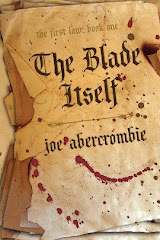.jpg)

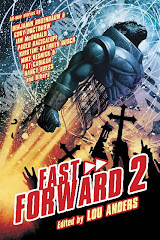
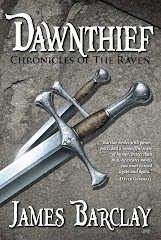
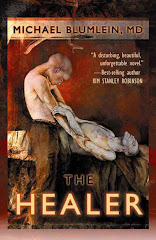
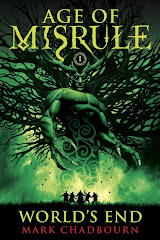.jpg)
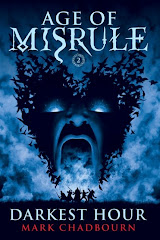

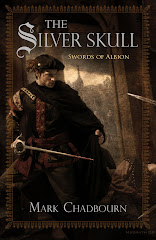


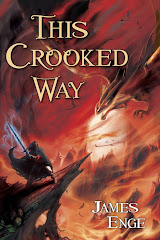
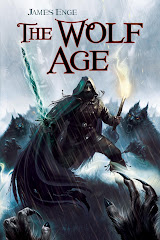


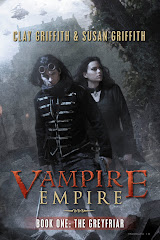
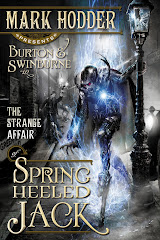


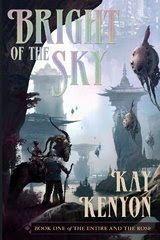.jpeg)
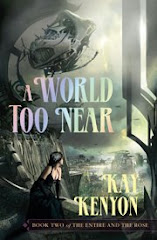.jpg)
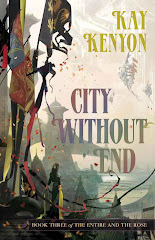


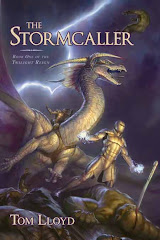
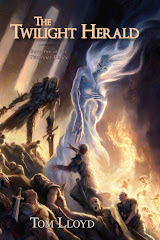
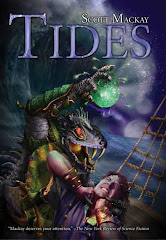

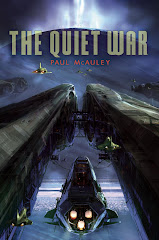

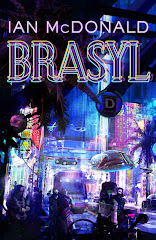

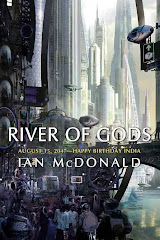.jpg)




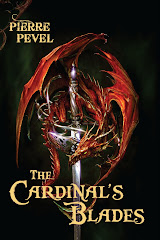


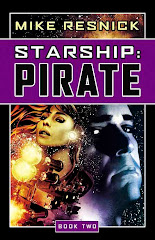
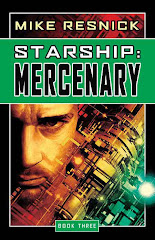

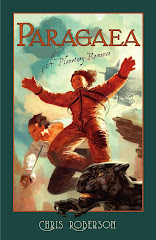
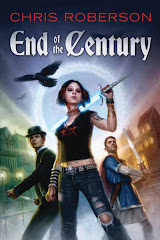


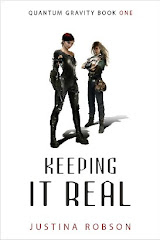.jpg)
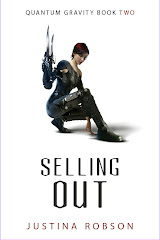
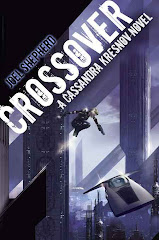
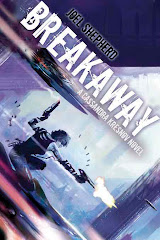
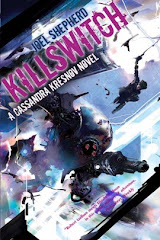.jpg)

